Media Center
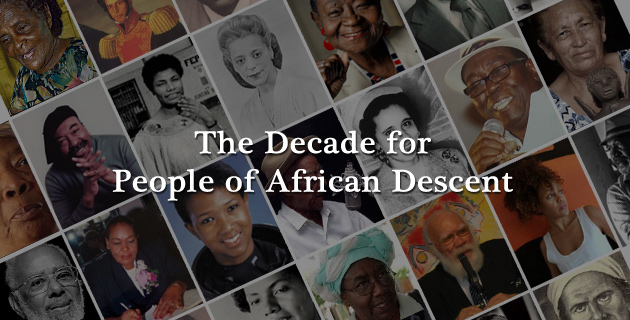
At its 2016 General Assembly, the Organization of American States (OAS) approved the Plan of Action for the Decade of Afro-Descendants in the Americas (2016-2025), in recognizing that people of African descent in the Americas are descendants of millions of Africans who were forcibly enslaved and transported as part of the inhumane transatlantic slave trade between the 15th and 19th centuries.
The Plan of Action outlines a series of key activities to promote awareness of the situation of people of African descent in the Americas and to ensure their full participation in social, economic and political life and mandates the annual commemoration of the International Day for the Remembrance of Victims of Slavery and the Trans-Atlantic Slave Trade.
In February 2018, Member States adopted a Resolution establishing the Inter-American Week for People of African Descent in the Americas to remember the legacy of slavery and the slave trade, and their consequences on the lives of Afro-descendants, while also fostering greater awareness and respect for the diversity of the heritage and culture of people of African descent and their contribution to the development of society.
In celebration of the International Decade for People of African Descent in the Americas, and in keeping with the spirit of the Resolution, the OAS is highlighting the influence of Afro-descendants in shaping our societies by profiling historically renowned figures who have excelled in their national or hemispheric contribution to Arts and Culture, Sports, Politics, Human Rights, and Science or who through their labor have made a significant contribution to their nations or their region.
The celebration takes place within the framework of the United Nations General Assembly resolution, which proclaimed 2015-2024 as the Decade of People of African Descent, citing "the need to strengthen national, regional and international cooperation in relation to the Full economic, social, cultural, civil and civil rights enjoyment of Afro-descendants and their full and equal participation in all aspects of society."
Luis Almagro Lemes
Remarks by Secretary General Luis Almagro - Inter-American Week for People of African Descent
Nestor Mendez
Opening Remarks of the OAS Assistant Secretary General, Ambassador Nestor Mendez, in the inauguration ceremony of the VII Inter-American Week for People of African Descent
VII Inter-American Week for People of African Descent in the Americas
OAS Podcasts Series:
Tea PartySocial "Storytime with Miss Yolande"
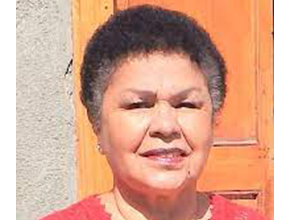
Sonia Salgado Henríquez
Place of Birth: Arica, Chile
Date of birth: March 23, 1947
A prominent Chilean woman of African descent, Sonia Salgado Henríquez was elected by Aymara communities, and is a social worker and former mayor of Camarones de Arica, where she served for 12 years. In 2001 she founded the NGO Oro Negro [Black Gold], a forerunner to other nation-level organizations having to do with municipalities, such as the Association of Municipalities. Sonia Salgado Henríquez is currently Honorary President of the NGO Oro Negro. She also: - Represented Chile at the World Summit on Discrimination, Racism, Xenophobia and Related Forms of Discrimination, held in Durban, South Africa, in 2001. - Organized the 1st meeting of indigenous women and women of African descent in Codpa. - Coordinated Chile’s strategic partnership with Mundo Afro of Uruguay. - Promoted the INSTITUTO DE FORMACION AFRO for one week in Arica (2002), focused on training the population of African descent in Arica and Azapa, especially adolescents. - Headed up the Municipality of Arica’s Office on People of African Descent, established in Chile in 2010 as one of the 8 offices in Latin America and the Caribbean.
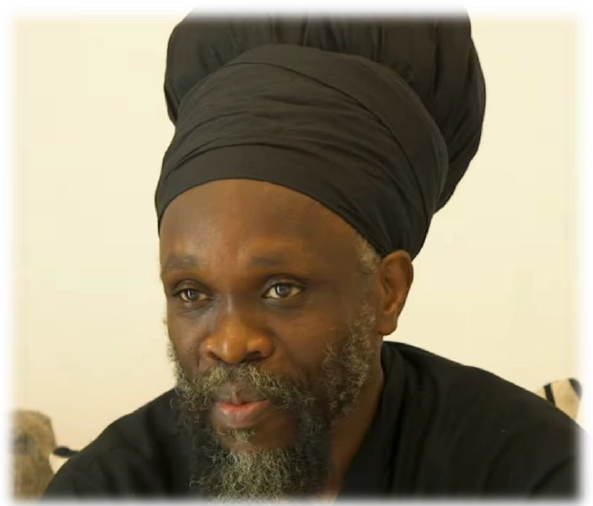
Rt Honorable Priest Kailash K. Leonce
Place of Birth: Laborie, Saint Lucia
Date of birth: October 9, 1977
Priest of the EABIC – Boboshanti Order Herbal Physician Rt Hon Priest Kailash K. Leonce, a Rastafari and Herbal Physician inspired by nature and science, began medical school in Cuba in 2001. The 2004 birth of his son spurred his creation of herbal remedies through The Great Physician International, drawing on medical knowledge and his grandmother Amo's herbal healing practices. Since 2005, he's worked globally, founding the Mount Kailash Rejuvenation Centre in 2014 for holistic living and, in February 2023, the Mount Kailash Herbal School of Esoteric Knowledge to pass on the ancestral knowledge of herbal medicine. An advocate for quality living across physical, emotional, spiritual, and ethereal realms, Rt Hon Priest Kailash leads various enterprises, including restaurants and an herbal product line, while promoting a simple and practical lifestyle philosophy. He also drives the maritime Ra-Star Liner Ltd, reflecting Marcus Garvey's unity ideals. He is also a leader in The UBUNTU Movement’s SEEDS project which empowers marginalized and high-risk communities. You can find more information on Honorable Priest Kailash on his website: www.mountkailashslu.com , https://youtube.com/@KAILASHLEONCE and https://instagram.com/honpriestkailash?igshid=15os2mcvdsrzr

Vinicius José Paixão de Oliveira Júnior
Place of birth: São Gonçalo, Rio de Janeiro
Date of birth: December 7, 2000
A footballer who plays for Real Madrid and the Brazilian national team, he shot to worldwide fame when Flamengo sold him to Real Madrid for 45 million euros at just 16 years old. A member of the Brazilian national team since 2015, his contributions to the teams he plays for are undeniable. A recurring victim of racism, Vini Jr chooses not only not to remain silent, but to denounce the attacks he suffers. In June 2023, he joined FIFA's Anti-Racism Committee and in February 2024 he became the second Brazilian footballer since Pelé to serve as a UNESCO Goodwill Ambassador. UNESCO's nomination recognizes his commitment from an early age to promoting equal opportunities through education in Brazil.
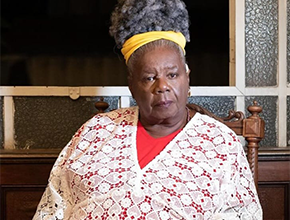
Maria da Conceição Evaristo de Brito
Place of birth: Belo Horizonte, Minas Gerais
Date of birth: November 29, 1976
One of the foremost figures in contemporary Brazilian women's literature, she was honored in 2019 as Literary Personality of the Year by the Jabuti Prize, Brazil's biggest literary award. Her works rescue ancestry and celebrate the "black-Brazilian" genealogy, as well as portraying the daily lives of black women and the prejudice they face in the social, cultural, and political spheres. On February 15, 2024, Conceição Evaristo was elected to chair number 40 of the Minas Gerais Academy of Letters.
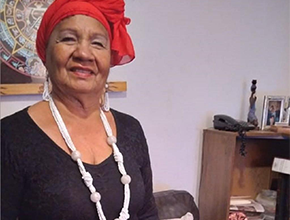
Marta Victoria Salgado Henríquez
Place of Birth: Arica, Chile
Date of birth: 1947
Marta Victoria Salgado Henríquez is a leader and activist belonging to the Chilean Afro-descendent Tribal People, who promotes cultural preservation and protection of civil rights for the African Diaspora. She has founded several nongovernmental organizations to promote the rights of women and minorities and has served as a governmental advisor on those matters. Trained as a teacher and public administrator, she has written books and articles on the legacy of Africans in Chile. She was one of the promoters and activists behind the enactment of Law No. 21,157, which recognizes the Afro-descendent Tribal People in Chile.
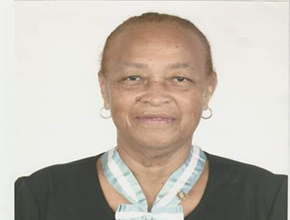
Peggy Lynch
Place of Birth: Izabal Department
Date of birth: June 7, 1937
An athlete who stood out at the First Central American Championships in Athletics (1958), held in Guatemala. She garnered important awards not only for her prowess in domestic and international competition, but also her dedication as a teacher and trainer in different sports disciplines, including: Order of the Quetzal: Guatemala's highest national award, given to those whose humanitarian, cultural, or political work has made an important contribution to the country. Order of Ixmucané, a distinction awarded to Guatemalan women who have dedicated their lives to the cultural and artistic development of their people and have contributed to a fairer, more equitable, and pluralistic society. Order of Francisco Marroquín, awarded to the country’s outstanding educators. Commemorative Medal for "Guatemalan Sports Glories, in the Golden Age" She was also president of the Izabal Fraternity, which promotes the integral development of Izabal, the largest Garífuna community in Guatemala.
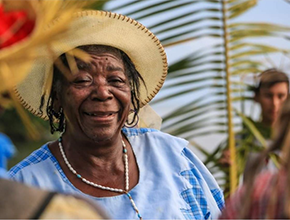
Elvira Álvarez Castillo de Ciego
Place of Birth: Livingston, Izabal, Guatemala
Date of birth: May 5, 1953
Doña Elvira, a character with stories to tell and a true emblem and promoter of the Garífuna culture, is a composer and singer-songwriter of traditional music. Elvira says that most of the songs she has composed came to to her in her dreams, and more than a dozen of them are sung at traditional centers. Among the voices in the song “Yurumein” (considered the Garífuna Nation’s anthem) is that of Doña Elvira, which is why she is regarded at home and abroad as an icon of the Garífuna culture of Guatemala. She has taken part in several documentaries including the program "La Cocina de la Abuela.” Doña Elvira is truly a worthy representative of her culture, a source of Garifuna pride, whose charisma and enormous contributions have set the name of her people on high.
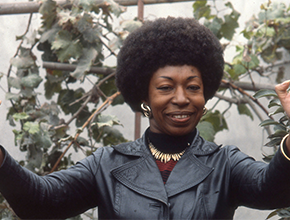
Victoria Eugenia Santa Cruz Gamarra
Place of Birth: Lima, Perú
Date of birth: October 27, 1922
Victoria Eugenia Santa Cruz Gamarra began her artistic career in 1958 as co-leader of the group Cumanana, alongside her younger brother, the fondly remembered decimist and poet Nicomedes Santa Cruz. Around 1962, she studied theater and choreography in France and upon her return in 1967 founded the company Teatro y Danzas Negros del Perú, with which she gave numerous presentations in Peru and abroad. Victoria was an outstanding choreographer, costume designer, composer, and scholar of Afro art and Peruvian folklore in general. In the course of her career, she recorded and performed numerous songs and poems. Some of them, such as Me gritaron negra, became well-known public favorites. In addition to being an exceptionally talented composer and performer, Victoria also dedicated her life to compiling and rescuing Afro-Peruvian artistic expressions, such as the Alcatraz and the Zamacueca. For nine years she led the National Folklore Ensemble at the National Institute of Culture, with which she went on successful international tours. In the 1980s and 1990s she was a visiting professor at leading educational institutions and spent more than 10 years as a professor and researcher at Carnegie Mellon University, in the United States. She has also led workshops in countries such as Russia, Israel, Argentina, Spain, and Italy, among others.

Susana Esther Baca de la Colina
Place of Birth: Lima, Perú
Date of birth: May 24, 1944
A performer, composer, and researcher, she embarked on her artistic career in 1970 with sponsorship from the Institute of Modern Art and the National Institute of Culture of Peru. She has developed and presented more than 100 different music programs, with repertoires ranging from the traditional black songs of the Peruvian coast to the interpretation of poetry by Peruvian and Latin American authors, as well as the recreation of black music in Peru, Latin America, and the Caribbean. Approximately 200 songs from that repertoire have been presented at more than 600 concerts in the most important theaters of almost all the capitals of the world. She has won three Latin Grammys and garnered important awards and acclaim from critics and different institutions. She has more than 100 international tours, countless festivals, and 29 personal albums to her name, as well as being represented in more than 200 compilation recordings. She has collaborated with the most prestigious contemporary artists in the music world. She is considered one the greatest divas of world music and is renowned for her leadership as an artist and opinion shaper in Latin America. She has served as Minister of Culture and been awarded the Order of Merit in the Order of the Sun for distinguished services to the Nation by the President of the Republic of Peru. She was awarded the Juan Pablo Viscardo y Guzmán Medal by the Congress of the Republic of Peru and holds honorary doctorates from Enrique Guzmán y Valle University and the Berklee College of Music. She has earned teaching and artistic awards from the Ministry of Education, is a chevalier de l'ordre des arts et lettres from the Republic of France, and won the National Culture Prize. In addition, she serves as cultural ambassador for several cities in Peru as well as institutions involved in the protection of children.
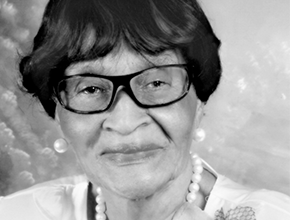
Marcelle Taylor Brown
Place of Birth: Limón, Costa Rica
Date of Birth: January 3, 1933
Marcelle Taylor Brown is an educator and a political and community leader from Costa Rica. She was inducted into the Women's Gallery (2017 Edition), for her contribution to the defense, rescue, and strengthening of the country’s Afro-Caribbean culture and for her campaigns for the inclusion of women and girls from Limón in education, culture, sport, and politics. A teacher by profession with emphasis on Spanish, she worked as an educator for 33 years in different primary, secondary, and university education settings in the province of Limón, leaving a mark on the history of education in the province. As part of her political career, she was the first black woman to head a Social Christian Unity Party ballot for the Province of Limón, where she was elected as deputy for the 1986-1990 term. Her broad experience in educational issues, her extensive contributions to education in Limón, her efforts to address community problems, and her political trajectory earned her declaration as an Honored Citizen by the Legislative Assembly of Costa Rica in 2023.
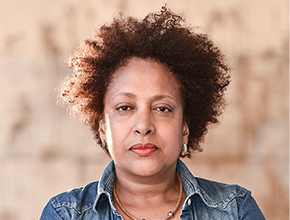
Miriam Victoria Gomes
Place of Birth: Buenos Aires, Argentina
Date of birth: January 1, 1962
Professor Miriam Victoria Gomes is a descendant of Cape Verdean immigrants. She has helped establish African and Afro-descendent organizations and belonged to bodies coordinating the activities of black entities in the country and the region. She has published numerous articles on African influence on society and participated in countless forums, raising awareness about the contributions of African descendants. She has encouraged the reporting of racial violence and supported victims. She advised the Universidad Nacional Tres de Febrero and the National Institute of Statistics and Census of Argentina on the pilot population test that determined that Afro-descendants accout for 4 percent of the country’s population. She coordinated the national awareness campaign for the Afro-descendent variable in the 2010 national census. She has fought tirelessly—as she still does—to eradicate dehumanizing stereotypes about black people, as well as discrimination, xenophobia, and racism. She teaches literature at the secondary and university levels.
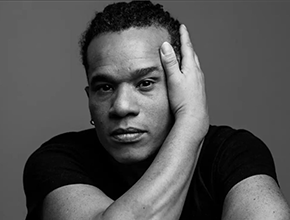
Emanuel Ntaka
Place of Birth: Buenos Aires, Argentina
Date of birth: December 8, 1977
An Afro-Argentine singer, musician, and artistic producer, he is the son of a South African human rights activist and jazz singer and an Argentine philosopher/theologian. As a child, he absorbed his father's musical traditions and explored various genres. His contribution to the cultural scene includes participation in various musical and theatrical projects of national and international renown. He stands out for his work to raise the profile of Afro-Argentine and African culture by organizing awareness-raising workshops, festivals, audiovisual material, documentaries, and exhibitions with the community, among other activities. His work as producer of the album Sonidos Negros en Argentina with African and Afro-descendent artists earned him a Cultural Interest award from the legislature of the Autonomous City of Buenos Aires. He defines himself as someone who uses artistic idioms to vindicate the struggles of his ancestors against racism and the recognition of the contributions of Afro-Argentineans and Africans to Argentine and Latin American cultural identity.
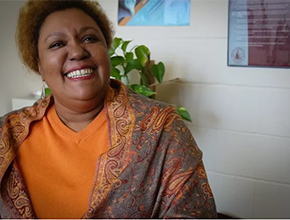
Cristina Rodriguez Cabral
Place of Birth: Montevideo, Uruguay
Date of birth: May 26, 1959
Cristina Rodriguez Cabral is one of the most important contemporary Afro-descendent writers. She holds degrees in sociology and nursing from the Universidad de la República (Uruguay). She currently resides in the United States, where she did her graduate studies: an M.A. at Indiana University (Pennsylvania) in 1999 and a Ph.D. in Philosophy at the University of Missouri (Columbia) in 2004. She works as a researcher and university lecturer. Her work is studied mainly by North American scholars and her poems have appeared in magazines such as Afro-Hispanic Review. For her, poetry is a trench, a space of memory (of her ancestors, of her family's past), a form of resistance to male chauvinism and racism, and a way of proclaiming her womanhood. Her literary activity sprang from her activism on social issues, and she began publishing in the early 1990s. Today, Rodríguez Cabral says that poetry is how she expresses her social commitment. Her work in general contains manifestations of resistance to marginalization and oppression, both racial and gender-related. There is in her works “a need to remember and reaffirm the values inherited both from her family and from Africa.” Her early work focuses on her intimate feelings and experiences from the standpoint of a Hispanic American black woman. In her post-1995 work she introduces themes relating to social activism, racism, and cultural identity.
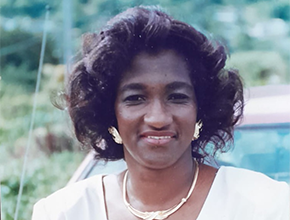
Lorna ‘Ava’ Henry
Place of Birth: Mc. Knight, Saint Kitts and Nevis
Date of birth: 1960
Ms. Lorna ‘Ava’ Henry was born and raised in Mc. Knight and was the Federation’s first Choreographer/ Dance Director. At the age of fifteen, she joined the Okolo Tegremantine Arts Theatre where she remained for 35 years and was lead choreographer for 32 years. Considered the Federations’ “Queen of Dance”, Ava lived for the development of dance. Her experience and passion were pivotal in her appointment as Dance Specialist at the Department of Culture in 1996. There, she poured her all into facilitating training, choreographing routines, and preserving traditional dance through documentation and folklore group development. Ava represents a powerful example of a proud black female creative who has achieved success through embracing, celebrating, and expressing her heritage through dance. Countless others are inspired to follow her lead as many of our new stars in local dance can trace the influence on their craft through Ms. Lorna Ava Henry.
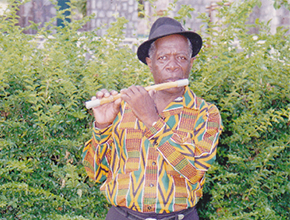
David James Freeman
Place of Birth: Butlers, Saint Kitts and Nevis
Date of birth: February 16, 1928
David James Freeman, born on February 16th, 1928, was a Nevisian national and a renowned fifer known as "De Maestro." With a career spanning 65 years, he was considered the most accomplished fifer of the century. Mr. Freeman inherited his passion for fife playing from his father, an accomplished fifer himself. He started playing for the original Honeybees Stringband in Brown Pasture before joining Jimmy Mackerel’s Stringband in Rawlins. Freeman later formed his own Honeybees Stringband and became the owner of the Joy Bell Big Drum, both of which accompanied many folk performances on Nevis. In 1999, Freeman served as the Patron and parade Grand Marshall for the 25th Anniversary of the Honeybees Stringband. Mr. Freeman represented St. Kitts & Nevis at six CARIFESTAs and toured several countries, including St. Eustatius, Canada, USVI, Montserrat, and St. Maarten, with his Stringband and Big Drum, providing music for various folk dances.
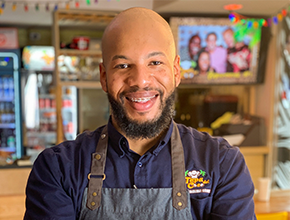
Issac Villaverde
Place of Birth: Panama City, Panama
Date of birth: February 9, 1989
Isaac Villaverde was born and raised in Río Abajo, the primary settlement of the Afro community in Panama. His Afro-descendant heritage and passion for cooking emerged from an early age. After studying business at the Universidad Latina de Panamá, he became a prominent representative of Afro-Panamanian gastronomy. With determination, he founded La Tapa del Coco, initially as a catering service offering traditional dishes such as meat and plantain pies, fried codfish, and Caribbean-style chicken. His venture evolved into a cultural movement that bridges past generations with "Afromillennials," the future of the community. Isaac has been recognized as a culinary leader and human rights advocate. He has collaborated with prominent figures and culinary events, promoting Afro-Panamanian cuisine internationally. His restaurant, La Tapa del Coco, is now a symbol of Afro-Panamanian gastronomy and continues to be a space for celebrating Afro culture and identity. With every dish he prepares, Isaac honors the memory of his grandmother, who inspired him to persevere. His legacy lives on in every bite and in his commitment to the Afro-descendant community of Panama and beyond.
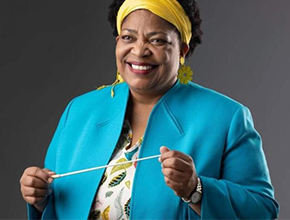
Electra Castillo
Place of Birth: Darién, Panama
Date of birth: 1964
Electra Castillo is the first Panamanian woman to conduct the National Symphony Orchestra in one of its performances. She graduated from the National Institute with a Bachelor's degree in Science and from the National Conservatory of Panama with a Technical degree in singing. She is the Director of the Network of Children's and Youth Orchestras and Choirs at the Ministry of Culture of Panama. Additionally, she is a cultural promoter, advocating for culture to change the perception of our surroundings. She holds a technical degree in Oboe from the University of Panama, with further studies in Oboe and Singing. She held the position of General and Musical Director of the Orchestra and Choir of the World Youth Day JMJ Panama 2019. She organized and directed the international festival "Canta Pueblo" Panama version, as well as served as a workshop facilitator for "America Cantat." She was responsible for the Cultural Program and Director of the Choir at the Technological University of Panama.
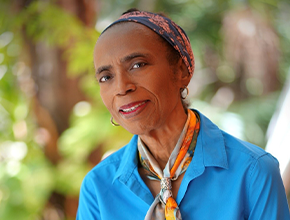
Patricia Glinton-Meicholas
Place of Birth: Cat Island, The Bahamas
Date of birth: February 19, 1950
Patricia Glinton-Meicholas, OM, is a poet, sociopolitical essayist, cultural historian and author of 22 books, with several used in her nation’s schools. She co-authored Bahamian Art 1492 to 1992, and her book Masters of the Sea is the first comprehensive exposition on the Bahamian sailing/regatta tradition. She is a recognized authority on Bahamas folklore, art and culture- subjects of her presentations at home and abroad. Her monograph on Bahamian folktales appears in the Encuentros series of the Inter-American Development Bank. She has contributed to such noted publications as Routledge’s Companion to International Children’s Literature, New Daughters of Africa, the Grove Dictionary of Art, and the Oxford University Press Dictionary of Caribbean and Afro-Latin American Biography. This graduate of the University of the West Indies and the University of Miami was named an Officer of the Order of Merit in 2021 and holds other national honors.
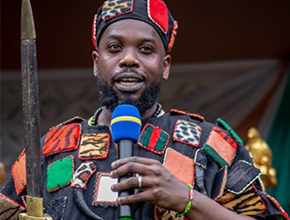
Nana John Canoe II (Christopher Davis)
Place of Birth: Nassau, The Bahamas
Date of birth: January 19, 1986
Nana John Canoe II is a dynamic force weaving history, sport, and Pan-Africanism into an electrifying tapestry. His legendary journey takes us from the sandy shores of Nassau, The Bahamas, to the revered halls of African scholarship." Former Goalkeeper turned Safohene (Warrior King), he was a regional pioneer in Beach Soccer and is now a global ambassador for PanAfricanism. He unveiled hidden truths of Junkanoo, the Saltwater Underground Railroad, and the African Diaspora, captivating audiences worldwide. He works at the Clifton Heritage National Park where he is spearheading a new research and museums department. John Canoe II has put The Bahamas on the map in the world of black scholarship. His research has influenced the appointment of a Bahamian Ambassador in Ghana, a resurgence among the Ahanta people and strengthened bonds between the Caribbean and Africa. Witness the resurgence of John Canoe – an author/co-author of works such as, “BLACK RINSE: A New Perspective on the History of the African Diaspora in The Bahamas”, the updated BGCSE History Textbook & Curriculum, The Astrolabe featured article, “Clothed in Mystery: The Origins of Junkanoo Part 1 & 2” in the Times of The Islands magazine, just to name a few. He is a beacon of Afrocentric perspective, a catalyst for change.
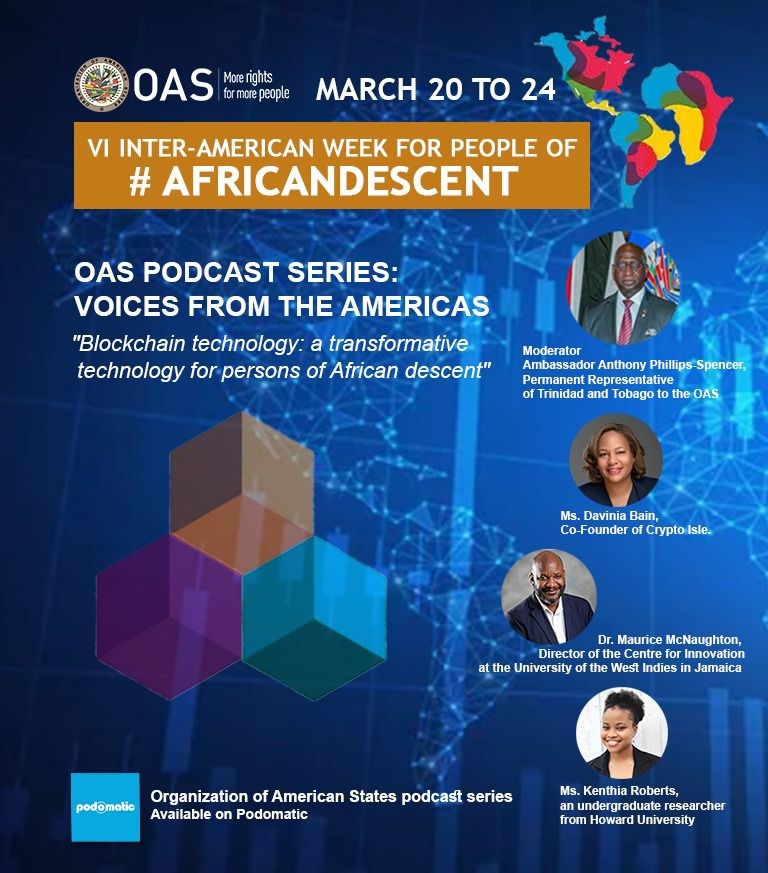
OAS Podcasts Series:
Voices from the Americas
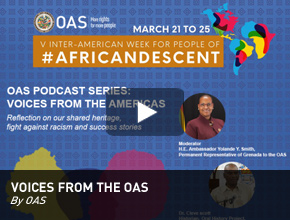
OAS Podcasts Series:
Voices from the OAS
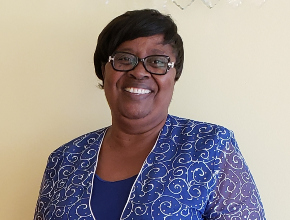
Vanta Ellerdene Walters
Place of Birth: St. Kitts and Nevis
Date of birth: July 9, 1952
For more than four decades, Mrs. Vanta Walters has dedicated her career to education, with a particular focus on early childhood development. Throughout her career, she worked in various capacities within the education sector, including twenty years in primary education. From 1990 to 2010, she served as the National Early Childhood Development Coordinator in her home country, representing the federation on the Directing Council of the Inter American Children Institute. Mrs. Walters' extensive work within the early childhood sector includes coordinating UNICEF programmes and conducting numerous educational workshops. She assessed Early Childhood interns from SERVOL and served on the Probation and Child Welfare Board, among many other education committees. Her impact on the field of early childhood extended beyond her local community and reached the regional and international levels. As a pioneer in early childhood education, she led the charge in regional early childhood sector reform. Mrs. Walters was instrumental in numerous early childhood initiatives, including introducing the licensing of centres in the region and a comprehensive training programme for parents in "Better Parenting." She also developed a new policy for Early Childhood, a federal early childhood policy, and a toy lending library. She served on numerous statutory boards and was intimately involved in designing policies and strategies for preventing school failure. In recognition of her contributions to education and early childhood development, Mrs. Walters received the "Medal of Honour" upon her retirement in October 2010. Her work and dedication to the field of education and early childhood development continue to impact the lives of many, leaving a lasting legacy in the education sector.
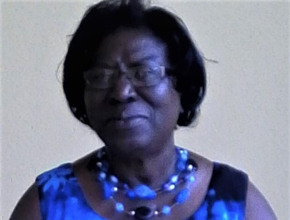
Clarice Cotton
Place of Birth: St. Kitts and Nevis
Date of birth: June 29, 1953
Clarice Cotton has worked in the field of education for over five decades and has brought a radical transformation to the lives of children and adults with special needs. Ms. Cotton’s passion for children who are differently abled was very evident as early in her career she pursued a Bachelor’s specializing in Special Education. Her door to door campaign to ensure that children with special needs were included into our society took her to multiple villages. This grassroots approach worked as parents felt more comfortable entrusting their children to educators who they knew. She also led a team of like-minded educators to write the special education curriculum which gave special needs students access and exposure to the same educational experiences as their counterparts in other schools. Ms. Cotton was instrumental in introducing Special Olympics to St. Kitts and Nevis. She retired in 2015 but focused her attention on volunteering at Ade’s Place which is a centre for adults with disabilities. Today the school for students who are differently abled was co-named and bears her name - Cotton Thomas Comprehensive School.
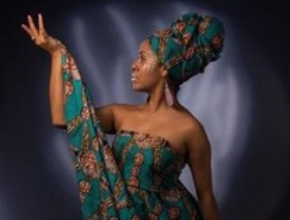
Marisol Alcocer Perulero
Place of Birth: San Marcos, Guerrero, Mexico
Date of birth: July 25, 1985
Marisol Alcocer, a feminist and anti-racist, is coordinator of the B.A. program in Human Rights (Mixed Modality), as well as a professor-researcher on the M.A. program in Violence Studies and Conflict Management at Acapulco Law School, UAGRo. She holds a doctorate in Social Science Research from FLACSO, Mexico. Her main lines of research are violence in its multiple forms, feminicide, and racism. She is also co-coordinator of the CONACyT national priority project “Multiple violence and racism in Guerrero: Towards transformative justice that contributes to peace building 2022–2024.” She was a member of the working group to investigate and analyze the situation of women's human rights in the State of Guerrero, which subsequently declared a “gender violence alert” (2017). With funding from CONACyT, she is conducting a post-doctoral stay at CIESAS in Mexico City, with the project “Vulnerabilities and differentiated violence against women in regions with mostly indigenous and Afro-Mexican populations in Guerrero 2018–2019.” She has attended research stays at the University of California, Santa Cruz, with Professor Emerita Rosa-Linda Fregoso to discuss feminicide from an intersectional perspective and to analyze feminicide of Afro-descendants in Mexico.
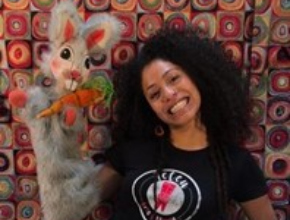
Krhistina Giles
Place of Birth: León, Guanajuato, México
Date of birth: December 8, 1989
An Afro-Mexican multidisciplinary artist (actress, singer, dancer, and puppeteer) from León, Guanajuato, Krhistina Giles lives in Mexico City. She is a cultural manager, creative stage performer, activist for the rights of people of African descent and their communities in Mexico, and arts educator focused on children of African descent. She co-founded the Mexico City Afro-Descendant Women’s Network and IBU AÑA Afro-Diaspora women's groups and is a member of Poder Prieto.

Daniel Uriel Ventura Caceres
Place of Birth: Bogotá, Colombia
Date of birth: February 9, 1991
Daniel Uriel Ventura Caceres is a Colombian with a degree in philology and languages from the Universidad Nacional de Colombia. He also holds an MA in Modern Languages and Literature from the University of Palermo in Italy and MA in Literature and Germanic Studies from the University of Bremen in Germany. He was awarded a GSV teacher’s scholarship in Germany by DAAD He is a Fulbright Scholar in the Passport to Science program, under the PhD program in education and education policy at the State University of New York, Albany. He is the founder and director of Lingglo, a language platform that brings together professional teachers and volunteers to offer language classes—especially English classes—to low-income students. He is a co-founder and chief strategist of Beglo, a platform that seeks to promote and help Colombian students to access scholarships and international opportunities, especially in the United States and Europe, focusing primarily on minorities, women, leaders and residents of remote regions, and victims of Colombia's armed conflict. Creator of the Europortunidades International Education Fair with the support of the European Union Delegation in Colombia and the Organization of Ibero-American States, which aims to share and disseminate scholarship and funding opportunities for study abroad for remote and vulnerable communities in the region.
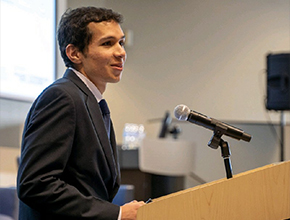
Francisco Javier Quinterto Cortes
Place of Birth: Paez, Cauca, Colombia
Date of birth: July 24, 1992
Francisco Javier Quinterto Cortes is a Colombian Fulbright scholar and chemical engineer who holds a PhD in materials science with a focus on the electrochemistry and battery development for the energy transition. He founded DeVolver ConCiencia, an initiative that supports vocational guidance for school students in deprived areas of Colombia. To achieve this, DeVolver ConCiencia creates and coordinates virtual talks and radio and television content specifically aimed at conflict-affected rural and urban areas with predominantly Afro-descendent and indigenous populations.
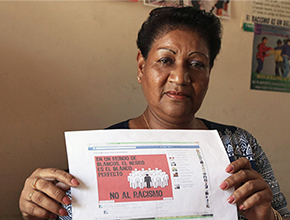
Socorro Celia Grados Santibañez
Place of Birth: Lima, Peru
Date of Birth: June 27, 1957
In 2015, Teresa Gonzales de Fanning High School teacher Celia Grados won the Education Ministry’s Teaching Best Practices Competition with her project for a re-evaluation of Afro-Peruvian culture. MINEDU picked up this initiative to implement the Multicultural Education for All proposal, sharing it with other prestigious schools, such as Pukllasunchis and Markham, which adopted part of her proposal. This sharing also gave her an opportunity to further enrich her project spotlighting the school's cultural diversity and to pursue anti-racism initiatives with other teachers and management, engaging students' families as well. In 2019, Celia Grados was also honored by the Ministry of Culture as a Distinguished Cultural Figure; and she continues to promote transformational education in one of the capital city's top schools, which has more than 2,800 students enrolled – 1,872 of them at the high school level.
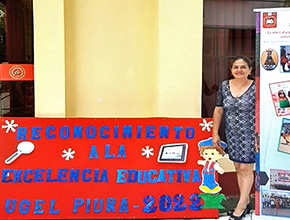
Mabel Cinthia Espinoza Florián
Place of Birth: Piura, Peru
Date of Birth: February 5, 1978
Mabel Espinoza teaches at Victor Francisco Rosales Ortega High School in the Pachitea neighborhood of Piura, northern Peru – a community with Afro-Peruvians. Her school has, altogether, 1,508 preschool, elementary, and high school students from a variety of cultural backgrounds. Having witnessed problems with discrimination, racism, and xenophobia, to address them she developed a project to mainstream the multicultural approach, "Multiculturalism as a vehicle for reflection on racism and discrimination," which in 2022 won the first “Towards a Racism-Free Peru” contest, organized by the civil society association Lundú, in the teaching experience category. The proposal involved teachers from all grade levels, families, raising awareness using such literary works as Victoria Santa Cruz’s Me Gritaron Negra (They Yelled ‘Black’ at Me), conducting exchanges and visits to places that feature Afro-Peruvian cultural expressions, etc. It thus promotes multicultural expression and combats stereotypes, prejudice, and discrimination.
View her proposal here: https://drive.google.com/file/d/1JJ3jm9RgVLJ4be9G1Oj30eiSgC1tFCaz/view
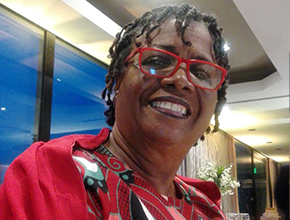
Grace Ann Maynard de Clark
Place of Birth: Rio Abajo, Republic of Panama
Date of Birth: February 20, 1946
Grace Ann de Clark was born to a Panamanian father and Costa Rican mother in a very humble family. She developed a love of studying and reading since she was very young. A graduate of the prestigious Nido de Águilas (Class of 1964), Grace Ann de Clark played a leading role in the January 9, 1964, campaign that paved the way for the country to regain its sovereignty over the Canal.
For more than four decades, she trained many of the country's professionals. Mama Grace – as she is affectionately known to some of her students – teaches mathematics and physics, and holds a Master’s degree in education. She has had a marked influence on her students, instilling in them the academic knowledge needed to develop themselves professionally and values to help them as they go about their daily lives. As a leader of African descent, she has been a spokesperson, activist, and living promoter of historical and cultural outreach on our contributions to humanity.
Grace has been a teachers’ union leader, a candidate for Deputy in the National Assembly, and an agro-exporter honored by the Government of Panama.
She has also been a leader in the community of people of African descent and guest lecturer on Afro-Panamanian history and contribution to national culture.
She is a member of the Government-appointed Advisory Committee SENADAP.
Grace Ann de Clark served as National Director for Informal Settlements and Acting Vice-Minister in the Ministry of Housing.
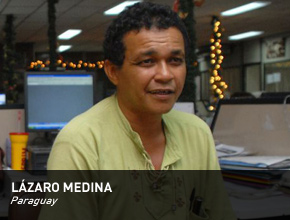
Lázaro Medina
Place of Birth: Fernando de la Mora, Paraguay
Date of Birth: November 9, 1962
Mr. Lázaro Medina devoted his life to the struggle to keep alive the traditions and customs of the people of African descent in Paraguay. He was a founder and director of the Kamba Cua Traditional Group Association (Kamba Cua Ballet since 1991), which has gained international recognition, winning important awards and distinctions.
Throughout his life, Lázaro Medina fought to get the Afro-Paraguay cultures recognized and for the descendants to take pride in their roots.
He was recognized for his participation as a panelist at the World Conference on Racism, Racial Discrimination and Other Forms of Intolerance in Durban, South Africa, in 2001, and has given lectures in several other countries. At the local level, he made it his business to visit all the Afro communities across the country, to meet with the people, listen to their needs, and render them support in their struggle against discrimination and losing their land. Medina’s was the only community group that at all times sought to reclaim the Afro-Paraguayan culture.
Renowned as a tireless advocate for the customs of his ancestors, Lázaro Medina inherited that tradition from his father, Santiago Medina, and was committed to passing them on to his children, nephews, nieces, nephews, and all members of his community. Peerless as a dancer, Lázaro Medina was also a prominent activist championing the survival of the Afro-Paraguayan tradition and has been considered the backbone of Kamba Cua Ballet.
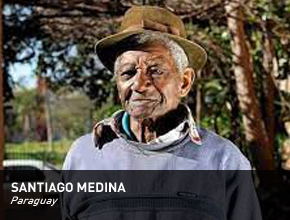
Santiago Medina
Place of Birth: San Lorenzo, Paraguay
Date of Birth: July 25, 1917
A dancer, teacher, and drummer, Santiago Medina created the Afro-Paraguayan drum and ballet group Kamba Cua and was its driving force.
He fought to preserve the African culture in the country. Thanks to his efforts, the community’s traditions were carried on from generation to generation, as the central pillar of Kamba Cua.
He contributed a great deal to Afro-Paraguayan culture as a dancer, drummer, teacher, and activist.
At 16, taking notice of how the customs, traditions, drumbeats, and dance forms were gradually being lost in the community, he set out to recreate, practice, and remember the beats of the rhythms that were being forgotten. He did this by practicing on top of a soap box every day, until he finally managed to remember all the musical beats again.
He then passed on his percussion skills to his cousins and neighbors in the Kamba Cua community. That was how the community would reclaim its cultural and ancestral identity to this very day, thanks to that young man, who had the vision to rediscover its roots through Kamba Cua drumming and dances.
Dubbed the grandfather of the Kamba Kua people, Santiago Medina was also a soccer player. He served in his country’s Cavalry, excelling as best rider, and was one of the founders of the Kamba Cua drum and ballet ensemble.

Sofia Carrillo
Place of Birth: Lima, Peru
Date of Birth: February 25, 1979
Sofia Carrillo is an Afro-Peruvian activist and human rights defender. With a degree in Journalism and a master’s degree in Social Management from PUCP, she is an expert in sexual and reproductive rights, gender, and intersectionality. She has worked in the public and private sectors.
In 2018, she was recognized by the Ministry of Justice and Human Rights for her defense of the rights of the Afro-Peruvian population, women, and excluded and discriminated communities. In 2019 Amnesty International recognized her as a human rights defender in the context of the global "Brave" campaign.
In 2017 she was the host of the program "A la Cuenta de Tres" on TV Perú. She currently hosts IRTP radio and television programs. She has participated as an official delegate and/or representative of civil society in international events on population and development in Mexico, England, Kenya, and the United States, to name a few.
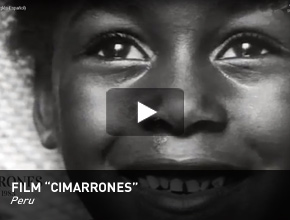
Film “Cimarrones”
Peru
Considered one of the first Peruvian social films, the short film Cimarrones narrates the episode in which a group of rebellious slaves who led a life of freedom far from the cities, assault a caravan and free two slaves that the Spanish settlers took to be executed.
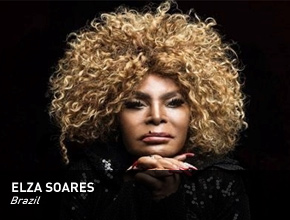
Elza Soares
Place of Birth: Rio de Janeiro, Brazil
Date of Birth: June 23, 1930
Elza Gomes da Conceição was a Brazilian composer and samba-enredo singer, who flirted with several musical genres, including samba, jazz, samba-jazz, sambalanço, bossa nova, mpb, soul, rock, and electronic music. Throughout her more than 60-year career, she had countless chart-topping hits in Brazil. Biggest among them were "Se Acaso Você Chegasse" (1960), "Boato" (1961), "Cadeira Vazia" (1961), "Só Danço Samba" (1963), "Mulata Assanhada" (1965) and "Aquarela Brasileira" (1974). Named “Singer of the Millennium” by BBC Radio in 1999, the singer will long be remembered as a strong representative of black activism in the country, for always supporting black women artists, and for fighting against prejudice in all its forms.
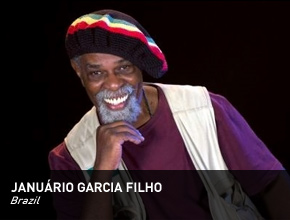
Januário Garcia Filho
Place of Birth: Belo Horizonte, Brazil
Date of Birth: November 16, 1943
Januário Garcia Filho was a Brazilian photographer who worked extensively in the areas of advertising, music, and documentation of African descendants in social, political, cultural, and economic spheres. He participated in important initiatives outside the professional sphere promoting the memory, art, and culture of black people. Januário also photographed iconic album covers for such artists as Gilberto Gil, Tim Maia, Belchior, Chico Buarque, and Leci Brandão. His work was exhibited in several countries. He graduated in Visual Communication from the International Cameraman School, interned at Studio Gamma under the guidance of photographer George Racz, and took extension courses in visual art, art history, and videomaking. He served as president of the Black Culture and Research Institute and was a member of the Zumbi Memorial Council. He produced more than 100,000 photographs in his career.
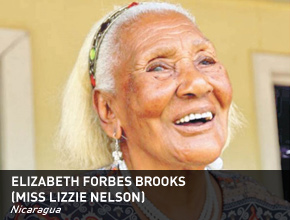
Elizabeth Forbes Brooks (Miss Lizzie Nelson)
Place of Birth: Punta Fría, Bluefields, Nicaragua
Date of Birth: December 11, 1922
Elizabeth Forbes Brooks (Miss Lizzie Nelson) was an elementary and secondary school teacher at Colegio Moravo in Bluefields for more than three decades. She was a tireless promoter of Creole culture, particularly Caribbean dance and the celebration of the May Pole Festival.
She was recognized by the RACCS Autonomous Regional Council as a Mother of Autonomy. She was the first person to be recognized as a Human Treasure of Nicaraguan Culture in 2011. She died on May 2, 2021.
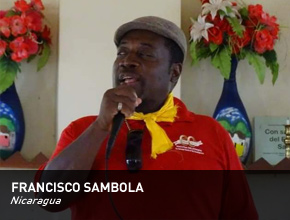
Francisco Sambola
Place of Birth: Orinoco Community, Pearl Lagoon, Nicaragua
Date of Birth: October 11, 1949
Francisco Sambola was a leader of the Garífuna People and grandson of the founder of the Orinoco Community, John Sambola. He was one of the main promoters of the revitalization of Garífuna culture in Nicaragua, especially the Garífuna people's language. He participated actively in the consultation process and enactment of Law 28 (Autonomy Statute of the Caribbean Coast of Nicaragua). He worked as an elementary school teacher for more than 20 years in different communities in the Pearl Lagoon Basin. He died on June 24, 2001.
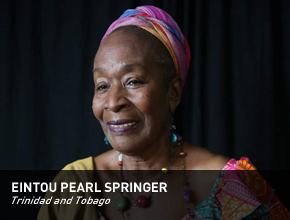
Eintou Pearl Springer
Place of Birth: Santa Cruz, Trinidad and Tobago
Date of Birth: November 24, 1944
Eintou Pearl Springer, born November 24, 1944, from Santa Cruz, Trinidad and Tobago, is an internationally recognised poet, playwright, award winning actress and traditional storyteller. She is the recipient of a National Award, the Humming Bird Silver, for her contribution to the Development of Art and Culture. Through her cultural family company IDAKEDA and NGO the Indigenous Creative Arts Network (ICAN), she has created initiatives for vulnerable populations using a combination of literature, history and theatre to empower youth in challenged communities.
She held the post of Poet Laureate of Port of Spain from 2000 to 2009 and has published four volumes of adult poetry, two volumes of poetry and stories for children, a book on African Heritage Sites in Trinidad and Tobago, a Social Studies text on the Caribbean and Survivor (currently a recommended reading for Theatre Arts students) a collection of thirteen (13) plays for children and young adults (2017). Her academic papers and poetry have been widely anthologised.

Short film "Ice Breakers"
Canada
Ice Breakers is a short film that reveals the buried history of a pioneering Black hockey league in Atlantic Canada.

Film “The Colour of Beauty”
Canada
The Colour of Beauty, produced by the National Film Board of Canada, is a shocking short documentary that examines racism in the fashion industry.
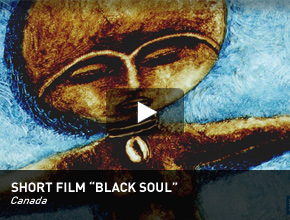
Short film “Black Soul”
Canada
Black Soul is a Canadian animated short film that dives into the heart of Black culture with an exhilarating trip though history. Watch as a young boy traces his roots through the stories his grandmother shares with him about the events that shaped their cultural heritage.
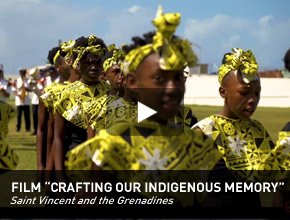
Film “Crafting Our Indigenous Memory” by Akley Olton
Saint Vincent and the Grenadines
The film “Crafting Our Indigenous Memory” by Akley Olton, is an exploration of handicraft production and the indigenous history of the Caribbean nation of Saint Vincent and the Grenadines.
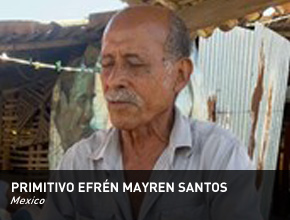
Primitivo Efrén Mayren Santos
Place of Birth: Oaxaca, Mexico
Date of Birth: June 19, 1937
Primitivo Efrén Mayren Santos, better known as don Efrén, is a proudly Afro-Mexican man who originally hails from the community of Ciruelo, Santiago Pinotepa Nacional, Oaxaca state.
In 1963 he started promoting the son de Artesa (Artesa sound), which was first played at the festival to the patron saint of Ciruelo. He also composed several songs reflecting his desire to incorporate identity elements in his music, including "Evento de negros," "El vagabundo," "Amor de pobre," "El pescador," "El mocosito," and "El chile suelto."
For don Efrén, the most important thing is to preserve and share cultural and historical heritage with young people, and to restore the Artesa sound as a core part of town festivals, El Ciruelo, Oaxaca, being the only Afro-Mexican community that sings and dances to its beats and rhythms.

Juliana Acevedo Avila
Place of Birth: Oaxaca, Mexico
Date of Birth: June 19, 1979
Through her work in different fields (poetry, painting, and activism), Juliana Acevedo Avila has raised the visibility of black or Afro-descendent communities in Mexico, as well as advancing respect for individual and collective human rights, particularly to eradicate racism and racial discrimination.
She has made representations before the Inter-American Commission on Human Rights for the statistical and legal recognition of Afro-Mexicans. She has also been a member of roundtables in dialogue with different government agencies. She currently works for the empowerment of black women by promoting processes to strengthen the leadership of Afro-Mexican women and is a member of the Mexico Chapter of the Network of Afro-Latin American, Afro-Caribbean and Diaspora Women.
In 2018, she published “Los Pueblos Negros de México: Su Lucha por la Sobrevivencia Cultural y el Reconocimiento Jurídico. Costa Chica de Oaxaca y Guerrero.”
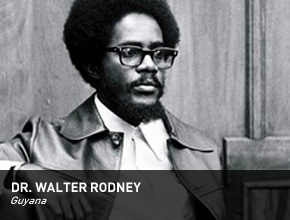
Dr. Walter Rodney
Place of Birth: Georgetown, Guyana
Date of Birth: March 23, 1942
Dr. Walter Anthony Rodney attended Queen’s College (the British established Grammar School) and graduated at the top of his class in 1960. He won an open scholarship to the University of the West Indies (UWI), Mona Campus in Jamaica, where he graduated in 1963 with a Bachelors of Arts (Honors) in History. He continued his studies at the School of Oriental and African Studies (SOAS), London University where he graduated in 1966 at age 24 with a PhD with Honors in African History.
In 1966, he took up his first teaching job at the University of Dar es Salaam in Tanzania. While there, he expanded his Pan-African perspectives along Marxist lines. In 1968, he returned to UWI in Jamaica where he taught an African history course. Rodney continued to use history to elucidate the oppression by the Europeans and became involved in the liberation struggles for Africa. Drawing from the apartheid and decolonization struggles, his seminal book was published in 1972 entitled ‘How Europe Underdeveloped Africa’.
In 1974, he returned to Guyana to take up a Professor of History Post at the University of Guyana. The appointment was rescinded by the Government. He then joined forces with various protest movements and became a founder of the Working People’s Alliance and was a key figure in the growing protest movement against the undemocratic rule of Mr. Burnham and the Peoples’ National Congress (PNC). Appearing as a threat to the latter, Dr. Rodney from here onwards, lived with continuous harassment from the police and threats until his assassination on June 13, 1980 by a bomb.
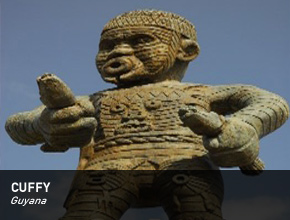
Cuffy
Place of Birth: Ghana and brought to Guiana via the transatlantic slave trade
Date of Birth: Unknown
Cuffy was an Akan who was captured in his native West Africa and worked on the plantations of the Dutch colony of Berbice in Guyana. He has become a national symbol of resistance, as in 1763 he led a revolt of more than 2,500 slaves against the Colonialists.
Cuffy lived in Lilienburg, a plantation on the Berbice River, as a house-slave. On 23 February (now Guyana’s Republic Day) 1763, slaves on plantation Magdalenenberg on the Canje River rebelled against harsh and inhumane treatment.
Cuffy was soon accepted by the rebels as their leader and declared himself Governor of Berbice. In doing so, he named Captain Accara as his deputy in charge of military affairs. On 2 April 1763, Cuffy wrote to Governor Van Hoogenheim saying that he did not want a war against the Colonists and proposed a partition of Berbice with the Colonists occupying the coastal areas and the ex-slaves the interior.
Governor Van Hoogenheim delayed his decision and replied that the Society of Berbice in Amsterdam had to make that decision and that it would take three to four months. The Governor was actually waiting for support from neighboring colonies, Suriname and Barbados.
Cuffy ordered his forces to attack the Colonists in May 1763, but in so doing suffered severe losses. The defeat opened a division among the rebels and weakened the rebellion. Accara became the leader of a new faction opposed to Cuffy and this led to a civil war amongst themselves. Cuffy was disheartened and in the face of many difficulties developing, committed suicide.
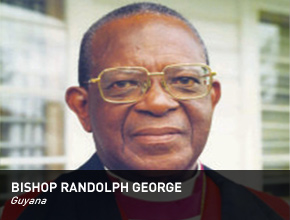
Bishop Randolph George
Place of Birth: Berbice , Guyana
Date of Birth: July 15 ,1924
Randolph Oswald George, former Bishop of Guyana was an astute and soft-spoken leader of the Anglican Diocese. Bishop George received his education and training for priesthood at the Codrington Theological College in Barbados. After his curacy at St. Peter in Barbados, he spent a decade in England and considerable time in Trinidad and Tobago.
Bishop George returned to Guyana where he became the Rector of the St. George’s Cathedral and Dean of Georgetown. In October 1976, Bishop George was promoted as the second Suffragan Bishop of Georgetown. A few years later, in 1980, Bishop George began serving as the Bishop of the prestigious St. George’s Cathedral located in Georgetown. He served in this post until his retirement in 2008.
In the troubled times of 1980s, Bishop George became an advocate for human rights, social justice, and change in the political system which had developed on Guyana becoming independent in 1966.
After the change of Government in 1992, he was chosen to head the Government’s Commission of Race Relations in 1993. A year later, he was bestowed with one of Guyana’s national awards, the Cacique Crown of Honour (CCH).
He will be remembered as a person whose “influence is deemed as one of a unifying nature due to his work to bridge the many gaps in our society.”
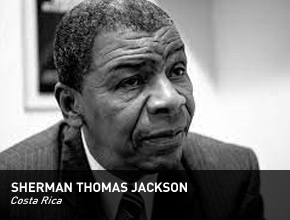
Sherman Thomas Jackson
Place of Birth: San José, Costa Rica
Date of Birth: January 24, 1939
Born to a Jamaican father and a Costa Rican mother, Sherman Thomas Jackson rose to prominence in the country's many struggles and became a leading figure for all Costa Rica's people of African descent.
He holds a doctorate degree in Chemistry and excelled in various positions at the University of Costa Rica since entering in 1958.
Devoting his life to academia, he was also interim Chancellor at the State Distance University and the first Afro-Costa Rican candidate for president, under the Costa Rican Renovation Party’s banner in the 1998 elections.
Sherman Thomas Jackson was also the first Afro-Costa Rican to serve as president of the Costa Rican Association of Chemists and Chemical Engineers.
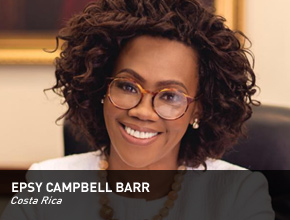
Epsy Campbell Barr
Place of Birth: San José, Costa Rica
Date of Birth: July 4, 1963
As Vice President of the Republic of Costa Rica (2018-2022), Epsy Campbell Barr was the first Afro-Costa Rican woman and the second woman of African descent to occupy this top leadership position in the Americas.
She was a driving force behind Costa Rica’s adoption of the Inter-American Convention against Racism, Racial Discrimination and Related Intolerance (2016), besides promoting commemoration of the International Day for People of African Descent (2021) and the Permanent Forum on People of African Descent at the United Nations (2021). She served as a member of the Committee that prepared the United Nations Development Programme’s “Regional Human Development Report for Latin America and the Caribbean: Multidimensional Progress” (2016); directed more than 15 international research projects; and authored 20 publications on social inclusion.
Ms. Campbell Barr tracks her country's domestic and international commitments to implement the International Decade for People of African Descent and its plans of action; and promotes a series of initiatives and strategies to benefit this population.
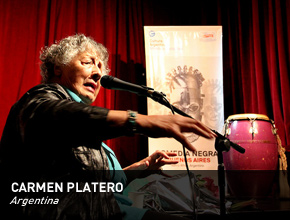
Carmen Platero
Place of Birth: Ciudad de La Plata, Buenos Aires Province, Argentina
Date of Birth: August 3, 1934
Carmen Platero was an Afro-Argentine playwright, who founded Comedia Negra de Buenos Aires (Black Comedy of Buenos Aires). Her contribution was instrumental in bringing visibility to Afro-Argentinean culture. Her first show was a one-person show, Tango para Solo de Mujer (One-Woman Tango).
She and her sister Susana Platero created the iconic play Calunga Andumba, with texts by Afro-Argentine and Afro-Latin American authors. It premiered in 1975.
When the military coup interrupted performances in 1976, Platero was forced to go into exile until democracy was restored in Argentina. A decade later, in 1987, she and her sister Susana founded Comedia Negra de Buenos Aires, as noted before.
We would like to note her participation at the III World Conference against Racism, Racial Discrimination, Xenophobia and Related Intolerance (Durban, 2001), which transformed the history of the Afro-international movement. Her impact in Argentina has empowered the voice of the Afro-Argentine organizations and the movement of people of African descent, contributing to their development as a social movement.
She passed away on March 16, 2020.
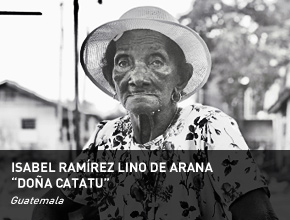
Isabel Ramírez Lino de Arana “Doña Catatu”
Place of Birth: Livingston, Guatemala
Date of Birth: November 8, 1927
Isabel Ramirez Lino De Arana, better known in the Guatemalan town of Labuga Livingston as “Doña Catatu,” is a 94-year-old Garifuna woman who had married Eusebio Arana Arzú and had 10 children.
A fighter, she worked as a midwife for more than seven decades helping many families of the various cultural backgrounds to be found in Livingston Izabal to bring their children into the world.
While there are no exact figures as to how many these were, the children of the Garifuna and Q'eqchi peoples, as well as those in the Indian and mestizo communities in the town of Livingston, are estimated to number between 1,400 and 1,600.
Typical sayings of Doña Catatu's, such as "I thank the Lord of Esquipulas for giving me the gift of not losing a single child during delivery," are hallmarks of the humility of this remarkable woman, who worked for all those years not seeking to profit off her patients.
Doña Catatu's humility and dedication to those who needed her help have made her an icon in the town of Livingston.

Viola Desmond
Place of Birth: Halifax, Nova Scotia, Canada
Date of Birth: July 6, 1914
Viola Desmond was a Black Canadian businesswoman and civil rights activist born in Halifax, Nova Scotia. In 1946, nine years before the famous bus protest of American Rosa Parks, Viola stood up to racial segregation by refusing to leave the “whites only” section of a movie theatre. She was arrested, jailed and convicted without legal representation on an obscure tax evasion charge (amounting to one cent). Viola and the Black community appealed to the provincial Supreme Court, and while ultimately unsuccessful, her courageous defiance galvanised Nova Scotia’s Black community and helped inspire Canada’s civil rights movement.
In 2010, the government of Nova Scotia apologised for this injustice, and she was granted a posthumous pardon by Nova Scotia’s first Black Lieutenant-Governor. In 2018, the Canadian government named Viola a National Historic Person, and she became the first Canadian woman to appear alone on a bank note – the $10 bill. Viola Desmond died February 7, 1965.

Barbarita Lara Calderón
Place of Birth: Mascarilla – Mira, Provincia del Carchi, Ecuador
Date of Birth: 1956
An Afro-Ecuadorian, Barbarita Lara Calderón emerged at a very young age as a leader in the communities of Valle del Chota and Mira, and at the age of 28 got involved in the Youth in Action and Progress Movement, dedicated to the development of infrastructure for basic services in the community of Mascarilla. Her activities reflected a process of political, social, and economic transition and transformation that was taking place in Ecuador – agrarian reform and the first oil boom – and which directly affected these communities.
She was part of the 1980s Afro-Ecuadorian Awareness Movement (MAEC) that gave her a platform to promote, share, and disseminate information about the Afro-Ecuadorian ethnic and cultural identity, as well as the history of Africans in Ecuador and in the Quito slums where Afro-Ecuadorians and Afro-Esmeraldas migrants lived. During this period she delved deeper into her roots and shared her insights.
In 2006, she was elected president of National Coordination for Black Women of Ecuador (CONAMUNE), a social movement focused on the struggle for the rights and demands of Afro-Ecuadorian women, for which she is a founding member.
Based on Barbarita's ethno-education work, a series of ethno-educational texts, "Origins. Afro-Ecuadorian Ethno-Education Modules," was published in 2012 on the history of Afro-Ecuadorians, for inclusion in the educational curriculum of schools and educational institutions in Valle del Chota and Carchi.
She holds a degree in pedagogy with a history and geography major, from the Central University of Ecuador; and an advanced diploma in cultural studies specializing in the Afro-Ecuadorian diaspora, from Simón Bolívar Andean University.
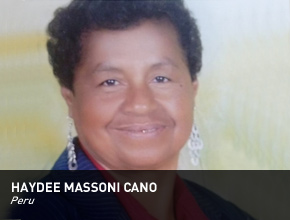
Haydee Massoni Cano
Place of Birth: Lima, Peru
Date of Birth: November 5, 1942
A founder of self-managed soup kitchens, Haydee Massoni Cano is also a stage actress, communicator, lawyer, and Afro-Peruvian activist. From a very young age she felt racial discrimination and the barriers it placed in the way of her progress. Even so, she became actively involved in community work because of her vocation of service. Besides taking care of her family, she worked as a community health delegate. In 1978, she got involved in starting self-managed soup kitchens. Around 1992, she was invited to the world of theater, where she felt that her activism as a person of African descent began, as a vehicle that helped build her self-esteem and identity. That experience led her to get involved with organizations for people of African descent, and she would later establish Pastoral Afroperuana de Comas (Comas Afro-Peruvian Ministry) and then Pastoral Afroperuana del Callao (Callao Afro-Peruvian Ministry). In 2016, she qualified as a lawyer and has continued her work as an Afro-Peruvian activist, stage actress, and community organizer.
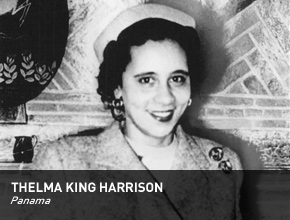
Thelma King Harrison
Place of Birth: Panama City, Republic of Panama
Date of Birth: January 31, 1921
Thelma King Harrison, whose mother was of Jamaican (mother) and English (father) descent, was a teacher, lawyer, journalist, and advocate for the dispossessed, for equal rights, and for Panamanian sovereignty.
Living in poverty spurred her to get an education. She taught herself English so she could communicate with her Jamaican grandmother.
She was the first female vice-consul (Liverpool-1957) and Deputy for the province of Colón (1960), the heart of the community of people of African descent – and spearheaded social and patriotic initiatives, such as the naming of the bridge over the Panama Canal as the "Bridge of the Americas." Backing the workers during the great banana strike (1962), she also led the international campaign for sovereignty as part of her involvement in the January 9, 1964 people's movement that triggered the annulment stage of Panama-United States relations.
Arrested in the 1969 military coup, Thelma King Harrison lived in exile until 1978 and died on November 7, 1993.
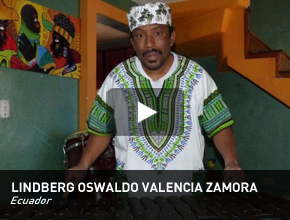
Lindberg Oswaldo Valencia Zamora
Place of Birth: Esmeraldas, Ecuador
Date of Birth: August 5, 1966
The renowned marimba musician, performer, educator, and researcher Lindberg Oswaldo Valencia Zamora was born in Esmeraldas, Ecuador, on August 5, 1966. He currently lectures on the marimba at the Faculty of Arts at Universidad Central of Esmeraldas and is also an instructor of Afro Casa-Bandas MDMQ.
Valencia Zamora studied music education at Universidad de Manabí; anthropology at Universidad Politécnica Salesiana; and physical education at Universidad Luis Vargas Torres.
He has made an outstanding contribution to numerous artistic endeavors and played with several musical bands including Tierra Caliente, La Katanga, Z-Mar, Chigualeros, Azuquito, Manglar, Azúcar Negra, La Grupa, Ecuatoriales Juyungo, and Ubuntu.

Walter Ferguson
Place of Birth: Guabito, Panama
Date of Birth: May 7, 1919
Walter Ferguson was born in Guabito, Panama, on May 7, 1919, but soon adopted Costa Rican nationality.
A celebrated composer and singer-songwriter from Limón and pioneer of calypso in Costa Rica, Walter Ferguson turns 102 years old this coming May 7. With more than 150 songs he composed – albeit only 40 have been recorded – over the course of his lifetime, Maestro Ferguson has built a legacy on the authentic expression of Afro-Caribbean culture.
His birthday coincides with the celebration of Costa Rica's National Calypso Day, following the 2018 recognition bestowed on the calypso genre as Costa Rica's intangible cultural heritage.
Little Walter grew up in a lush Caribbean setting, surrounded by nature and the sea, which provided him the perfect inspiration to create dozens of songs which, a century later, have catapulted him to status as an iconic of the Costa Rican Caribbean culture.
Thanks to his cultural legacy and his century of life dedicated to Caribbean music, Walter Ferguson now stands as Costa Rica's greatest calypsonian.

Lucía Asué Mbomío Rubio
Place of Birth: Madrid, Spain
Date of Birth: 1981
The journalist and writer Lucía Asué Mbomío Rubio was born in Madrid to a mother from Segovia and a father from Niefang, Equatorial Guinea.
She has worked as a reporter for such programs as Españoles en el Mundo (Tve1), Madrid Directo (Telemadrid), El Método Gonzo (Antena 3) and, currently, Aquí la Tierra (Tve1). She has done reports for Equatorial Guinea's public television (TVGE), covering HIV, teen pregnancy, or empowerment for people of differing abilities, and collaborating with organizations such as UNICEF, UNFPA, or the local NGO Biriaelat.
She has also directed and scripted documentaries for the Movistar TV series En Tierra de los Nadie, documenting the work of organizations such as Doctors of the World, International Justice Mission, or the International Organization for Migration, and covers issues such as the rebuilding in Haiti or sexual exploitation of children in Cambodia.
A teacher and activist as well, Lucía Asué Mbomío Rubio teaches Master's programs in journalism and workshops on media and people of African descent, and writes for the online magazine Afroféminas.
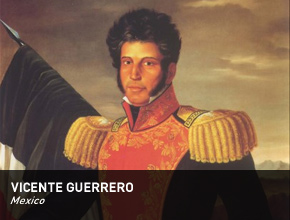
Vicente Guerrero
Place of Birth: Tixtla, State of Guerrero, Mexico
Date of Birth: August 9, 1782
Vicente Guerrero was born on August 9, 1782, in Tixtla, state of Guerrero. Mexico’s first president of African descent, he fought to end slavery and wove ties with indigenous groups.
Racial prejudice meant that he was the butt of insults disparaging his intellectual abilities. However, he harnessed discrimination as a means to achieve dignity and freedom for Mexicans, with the slogan "My homeland comes first.”
His multifaceted efforts helped shape the social, military, and political arena in the first half of the 19th century. A figurehead of resistance and rebellion and consummator of Mexico's independence in 1821, he worked tirelessly for a fairer and freer republican system.
In 1829, he issued the Decree of Abolition of Slavery and succeeded in removing the caste system from the statute books. In 1833, he was posthumously declared a Glorious Son of the Homeland.
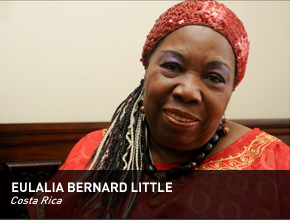
Eulalia Bernard Little
Place of Birth: Puerto Limón, Costa Rica
Date of Birth: 1935
Eulalia Bernard Little was the first Afro-Costa Rican woman to be published in Costa Rica. Through her writings, she has helped safeguard and pass down the cultural heritage of people of African descent. She has also received numerous awards for her work defending the rights of women and minorities, and is the founder of Chair of Afro-American Cultural Studies at the University of Costa Rica. She teaches Afro-Caribbean literature at universities in the United States and Canada.
Bernard served as a cultural attaché in Jamaica and also worked at the United Nations, researching the creative works of blacks in the Americas.
Eulalia Bernard publishes her works in Spanish, English, and Mekatelyu (Limon Creole). Drawing on the richness of her native Limón, her work depicts her province as the repository of the ancestral memory of the people of African descent and takes on an Afro-centric worldview, focusing on the existing relations between the Americas and Africa.
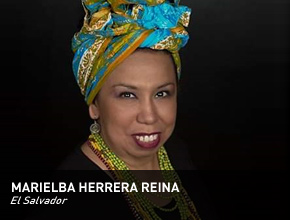
Marielba Herrera Reina
Place of Birth: San Salvador, El Salvador
Date of Birth: December 15, 1976
Marielba Herrera Reina is an Afro-Salvadorian anthropologist, university professor, and cultural consultant. She has researched and published books and articles on folk religion and identities of indigenous peoples and people of African descent in El Salvador and in a variety of Latin American contexts.
In 2019, she was selected to participate in the International Visitor Leadership Program (IVLP): “Minority and NGO Participation in the Democratic Process,” sponsored by the United States Department of State through the Public Affairs Section of the U.S. Embassy.
A member of the Afro-Latin American, Afro-Caribbean and Diaspora Women’s Network, Marielba Herrera Reina currently is also president and founder of the Afro-Central American Studies Network, the mission of which is to help academia and the Afro-Central American population promote the African legacy in the Diaspora and recognize the research output of Afro-Central American organic intellectuals.

Mae Jemison
Place of Birth: Decatur, Alabama
Date of Birth: October 17, 1956
Born in Decatur, Alabama and raised in Chicago, Illinois, May Jemison’s interest in space began at an early age. In 1977, she graduated from Stanford University with a Bachelor of Science degree in chemical engineering and a Bachelor of Arts degree in African and African American studies. In 1987, Jemison began the NASA astronaut training program. From September 12th to September 20th, 1992, Jemison became the first black women to travel into space as a mission specialist on Endeavour.
Following her NASA career, she started The Jemison Group, Inc., a firm focused on integrating socio-economic challenges into the design of engineering projects. She also founded the Dorothy Jemison Foundation for Excellence, which implements international educational programming to foster science literacy. In 2004, she was inducted into the International Space Hall of Fame. She has earned ten honorary doctorates and won numerous awards for her contributions to space exploration and science.

Jully Black
Place of Birth: Toronto, Canada
Date of Birth: November 8, 1977
Jully Black is a singer, songwriter, actress, and TV personality. Known as Canada’s Queen of R&B, she was named one of the “25 Greatest Canadian Singers Ever”, and is widely known for helping to affirm the presence of black artists in Canadian media.
Black was born to Jamaican immigrant parents and started to sing in church at age six. With the inspiration of her late sister, Sharon, and the lack of women in Canadian media, Black decided to pursue a career in music when she was just twelve years old. Besides collaborating with well-known artists such as Choclair and Kardinal Offishall, Black has written songs for Destiny’s Child, Nas, Sean Paul, Missy Elliott and others.
Black has also been involved in a wide-range of charitable work. In 2006, she performed at a benefit concert in South Africa alongside the Black Eyed Peas to raise funds and awareness for the Shanduka Foundation. In 2014, she hosted in Toronto, Kick It Up, which benefited Kidney Cancer Canada. Black is also a vocal advocate for LGTBQ communities, performing at various Pride events, including at World Pride (2015).
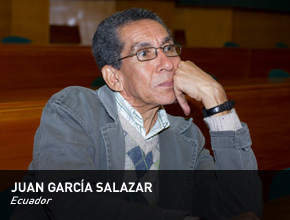
Juan García Salazar
Place of Birth: North of Esmeraldas, El Cuerval community, Ecuador
Date of Birth: 1944
Juan García Salazar was a Maroon and a thinker, a philosopher on the subject of re-existence, a history commentator, renowned educator, a cultivator and bastion of knowledge, and a griot of the ancestral-cultural tradition of the Afro-Ecuadorian people.
Garcia exposed several territories populated by peoples of African descent, including the African continent itself, the Caribbean, and the United States, as well as Latin America to his thinking, later receiving a master's degree in history from Johns Hopkins University (USA) in 1989. He is the author of more than 30 books and articles, and has won several national and international awards and recognitions for his intellectual and cultural contributions. In 2011, he was appointed honorary professor at UASB.
Garcia listened keenly to the elderly women and men of the Afro-descendant population of Ecuador and became the channel through whom their memories were transmitted. He is viewed as integral to the “philosophy of the African diaspora".
Notwithstanding, Garcia, who saw himself merely as a laborer in the process, became the Father of the Afro-Ecuadorian movement, thanks to whom the collective rights of the Afro-Ecuadorian people have been advanced, having been duly inscribed into the Political Constitution of Ecuador.

Jordan Greenway
Place of Birth: Canton, New Jersey
Date of Birth: February 16, 1997
Jordan Greenway began skating at the age of three. He continued his hockey career through elementary and high school before joining the USA Hockey National Team Development Program. While playing as a student at Boston University, Greenway was drafted by the National Hockey League to play for the Minnesota Wild.
On January 1st, 2018, Greenway became the first African-American selected to play for the U.S. Olympic Hockey team, which placed 7th overall. He has won numerous gold medals, including the World U-17 Hockey Challenge in 2014, the IIHF World U18 Championship in 2015, and the IIHF World U20 Championship in 2017.
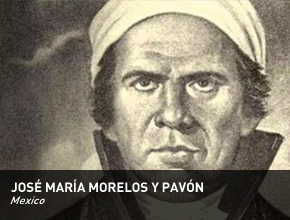
José María Morelos y Pavón
Place of Birth: Valladolid, Mexico
Date of Birth: September 30, 1765
José María Morelos y Pavón was born in the city of Valladolid, today Morelia, on September 30, 1765. Born to a humble family, at an early age he learned to read and write from his mother.
He was a Mexican priest and revolutionary rebel leader during the independence of Mexico.
On September 14, 1813, he drafted and presented the historical document "Sentiments of the Nation", in which section 15 highlights the importance of eliminating slavery and the distinction of caste, on the basis that all are equal.
José María Morelos officially decreed in Mexico the equality between Spaniards, Indians, Creoles, mestizos and members of the different castes.
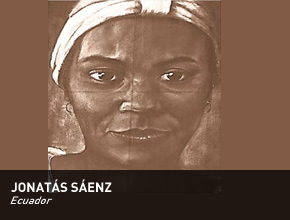
Jonatás Sáenz
Place of Birth:
Date of Birth: 1794
Jonatás Sáenz, a female militant in the struggle for the independence of South America, ranks among the most renowned women in the history of Ecuador. Jonatás and her cousin Nathán had been purchased by Simón Sáenz Vergara, and gifted to his daughter Manuela Sáenz Aizpuru. As was common at that time, Jonatás took the surname Saenz and spent many of the most important moments of Manuela’s life at her side, in conflicts and defeats, in glory and in exile, in joy and sadness. They were companions of struggle for eight years, during which they accompanied Bolívar in Peru and Santa Fé de Bogotá, were banished from Colombia in 1834 by Francisco de Paula Santander, and were together in exile in Jamaica and in Paita.
Highlighting her as an example (…) Jonatás became symbolic of the pivotal role played by slaves in creating a free America. Born into slavery, Jonatás survived long journeys, wars, hatred, envy and exile. They were female rebels of dignity who resisted, fought, and cherished liberty.
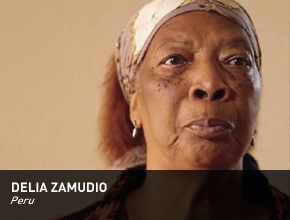
Delia Zamudio
Place of Birth: Hacienda Hoja Redonda (Chincha, Ica), Peru
Date of Birth: June 20, 1943
Delia Zamudio is a leader in the activism for the rights of Afro-Peruvian women. She is the first union leader to fight for the rights of workers; and also, the first woman to become the head the General Confederation of Workers of Peru (CGTP in Spanish), the main national trade union center in the country. As a founder of the Casa de Refugio San Juan de Lurigancho she has worked to assist victims of domestic and sexual violence. Zamudio is the Director of the Grupo Negro Mamainé, and she is recognized for a testimonial of her life in her book “Piel de mujer” (1995) - FOVIDA. The Municipality of San Juan de Lurigancho bestowed her with the Civic Medal for her outstanding social work in benefit of the women of the district, and she received the “Rostros de Poder” award from the Lundú organization. On International Women’s Day, she was recognized by the Ministry of Culture for her contributions to the cultural rights of Afro-Peruvian women with the Meritorious Personality of Culture Award.
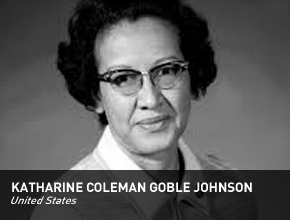
Katharine Coleman Goble Johnson
Place of Birth: White Sulphur Springs, West Virginia
Date of Birth: August 26, 1918
Born in White Sulphur Springs, West Virginia, Katharine Coleman Goble Johnson excelled at math. Johnson graduated from high school at the age of fourteen and enrolled at West Virginia State, a Historically Black College. In 1937, she graduated with a degree in mathematics and French at age 18. She is a member of Alpha Kappa Alpha Sorority, Inc. From 1958 to 1986, Johnson worked as an aerospace technologist at NASA, where she calculated the trajectory for the first American manned mission to space on May 5th, 1961.
Johnson received the Presidential Medal of Freedom in 2015 for her pioneering example as an African-American women in STEM. For her contributions to space exploration and mathematics, she received multiple awards from NASA and honorary doctorates. In 2016, the film Hidden Figures documented the work of Johnson and her fellow female African-American mathematicians. On February 24th, 2020, Johnson passed away at the age of 101 in Newport News, Virginia.

Lincoln Alexander
Place of Birth: Toronto, Canada
Date of Birth: January 21, 1922
The Honourable Lincoln M. Alexander is recognized as having paved the way for black Canadians in the world of federal and provincial politics. He served with the Royal Canadian Air Force during the Second World War and he was educated at Toronto’s Osgoode Hall School of Law, where he passed the bar in 1965. He was the first Black person to become a Member of Parliament in 1968 and served in the House of Commons until 1980. He was also federal Minister of Labour in 1979–1980.
In 1985, Lincoln Alexander was appointed Ontario’s 24th Lieutenant Governor, the first member of a visible minority to serve as the Queen’s representative in Ontario. During his term in office, youth and education were hallmarks of his mandate. The Honourable Lincoln Alexander was appointed a Companion of the Order of Canada and to the Order of Ontario in 1992, and in June 2006, he was named the “Greatest Hamiltonian of All Time.”
Mr. Alexander died on October 19, 2012 at age 90.
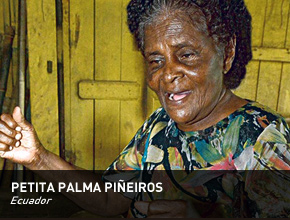
Petita Palma Piñeiros
Place of Birth: Carondelet, San Lorenzo Region, Esmeraldas Province, Ecuador
Date of Birth: March 4, 1927
One of the best known proponents of marimba and the music of the Esmeraldas Province, her singing reflected the union between natural and human elements in the musical landscape, fused with other aesthetics of musical expression. In 1969 Petita founded her first marimba school to expose future generations to her music, songs, dance and poetry.
In 1972 she founded the marimba music group "Tierra Caliente", touring several US cities including New York, as well as Boston where they performed as guests of Harvard University. On August 9, 2007, she was recognized by the National Government of Ecuador, and bestowed the "Eugenio Espejo" Award at the Carondelet Palace.
In September 2016, she was recognized by the Embassy of Ecuador in Nigeria for the 60 years over which she exposed new generations to important issues of cultural significance.
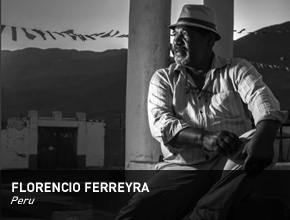
Florencio Ferreyra
Place of Birth: El Ingenio (Nasca, Ica), Peru
Date of Birth: October 16, 1951
Florencio Ferreyra is a community leader from the El Ingenio district, in the Nazca Province of the Ica Region of Peru and President of the Tomasita de Alcalá Black Movement. He is an Afro-Peruvian representative of the south-central zone in the National Commission on Intercultural Bilingual Education (CONEIB), of the Ministry of Education. He is a member of the Ministry of Culture’s Working Group with the Afro-Peruvian Population. He was recognized by the Congress of the Republic of Peru with the commemorative medal for Afro-Peruvian culture. He is a teacher with more than 35 years of service.

Mirtha Cartagena
Place of Birth: Chincha, Ica, Peru
Date of Birth: September 8, 1968
Mirtha Cartagena is an Afro-Peruvian activist from the El Carmen district, Chincha, Ica. She is the Director of the “Casa de la Mujer Carmelitana” Association, and Representative of the Working Group with the Afro-Peruvian Population (GTPA) of the Ministry of Culture. She was part of the Peruvian delegation of traditional Afro-descendant cooks who represented Peru in Colombia in the 2019 "International Meeting of Traditional Cuisines," which was sponsored by the ACUA Foundation's "Heritage of Knowledge" project. She is the winner of the "Public Actions" contest for Culture Points of the Ministry of Culture of Peru. In 2015 she was recognized by the Ministry of Culture for her contributions and work on behalf of Afro-Peruvian women from Ica. From 1999 to 2004 she served as Project Manager of the Institute of Communication and Environment (ICMA) in the El Carmen district, and as representative of the "Terre des Hommes" Organization of Switzerland. In 2017, she was recognized by the United States Embassy in Peru for her leadership in promoting inclusive and sustainable development with the environment among girls, boys and families in her community.
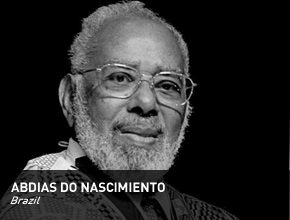
Abdias do Nascimiento
Place of Birth: Franca, São Paulo
Date of Birth: March 14, 1914
Abdias do Nascimento was a playwright, poet, painter, representative, and senator. Author of several books such as “Sortilégio”, “Dramas para Negro” and “O Negro Revoltado.” In these books he described the reality of the residents of “quilombos” - settlements established by escaped slaves in Brazil. He raised themes such as the history of African diaspora, fight against racism, promotion of racial democracy and the study of Afro-American religions.
In 1944, he founded the Black Experimental Theater, which sponsored the Negro National Convention in 1945 and 1946. In 1988, Abdias became responsible for establishing the Commission on the Centennial of Abolition.
As the first Afro descendant federal representative (1983-1987) of the Brazilian republic and as senator (1991, 1996-1999) he dedicated his mandates to the fight against prejudice. He was responsible for a law that defined racism as a crime and for creating compensatory action mechanisms. In 2001, he won the UNESCO Prize for Human Rights and Culture of Peace.
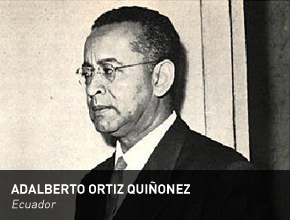
Adalberto Ortiz Quiñonez
Place of Birth: Esmeraldas, Ecuador
Date of Birth: February 9, 1914
Storyteller, poet and painter, representative of Ecuadorian black ethnicity, his works explore the world, culture and problems of this country's ethnic minority. He completed his studies at the Normal Juan Montalvo, where he graduated as a Normalista Professor in 1937.
In 1938, after reading the "Mapa de la Poesía Negra Americana” by the Cuban, Emilio Ballagas, Adalberto exclaimed "I have also been a poet". Immediately, he composed his first poetry, "Jolgorio", letting flourish the rhythms and black cadences that he had always had within him. After digging into the Afro American literature, Adalberto Ortiz developed the idea of writing about the Afro Ecuadorian people. He started writing Juyungo in 1939 and finished it in 1941. In 1942 he won the National Novel Competition with his work “Juyungo.”
He held diplomatic positions in Mexico, Paraguay and Argentina, where in 1951 he was appointed Secretary of the Guayas Nucleus of the House of Ecuadorian Culture. In 1954, he began making oil paintings; and in 1959, he obtained the First Honorary Mention in the "Salón de Octubre" in Guayaquil.
He worked as a Cultural Counselor for the Embassy of Ecuador in Paris, and as an Ambassador in Panama and the Dominican Republic. He died on February 1, 2003; by then he had concluded the collection "La Niebla encendida".
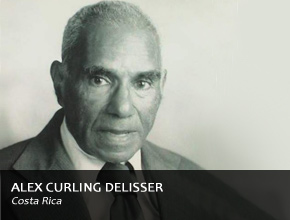
Alex Curling Delisser
Place of Birth: San Jose, Costa Rica
Date of Birth: September 3, 1908
Alex Curling was born in San Jose, Costa Rica. He was the descendant of Jamaican immigrants. During times of discrimination, racism, xenophobia, and intolerance, he became a defender of human rights, fighting for Afro-Costa Ricans to obtain their citizenship.
Some of his most important struggles include the confrontation against the political class that promoted Law No. 10 of 31.12.24 prohibiting the direct hiring of black workers in the banana fields of the pacific. They had ignored the protest of more than 100 black workers. Thanks to Curling’s effort, the Founding Assembly of the Second Republic abolished the law.
He became a congressman and promoted the Curling Law which gave nationality to afro descendants and their offspring born inside Costa Rica. Due to his work, the Legislative Assembly declared him Distinguished of the Homeland and the Afro-descendent community “Father of Legal Equality.”

Alonso de Illescas
Place of Birth: West Africa, currently the Republic of Senegal
Date of Birth: Circa 1528
Considered the greatest hero of the Afro Ecuadorian freedom, Alonso de Illescas led the creation of the "Republic of the Zambos" against a long resistance of the Spanish power. He was born circa 1528 in West Africa, captured at age 10, he came to serve in Spain as a slave of the merchant, Alonso de Illescas; this experience equipped him with the knowledge and skills that made him the leader of a large region. At age 25, he survived, along with 23 other slaves, a shipwreck on the coasts of Peru, allowing him to establish alliances, with the natives, against the Spanish conquerors. He overcame rivalries to assume a leadership role, moving towards the conservation of a territory free of imperial control and the machinations of tribes dissatisfied with their leadership. The resulting cohesion between black people, Indians and Zambians concluded in a multiethnic society free of colonial control, in which the authority of Illescas eminently arose.
Despite conflicts between Illescas and the Mangache community, also descendants from the enslaved circa 1553, they managed to overcome their differences to consolidate dominions and extend the possession of other specific spaces: the Illescas in Cabo Pasado, to the south, and the Mangache in the bay from San Mateo, to the north. The Spanish did not stop trying to retake control of these lands, and despite their initial resistance, Illescas sought alliances with the Crown concerning the maintenance of autonomy and leadership in their territories. In 1577 Miguel Cabello Balboa was commissioned to christianize the afro descendants, Indians and Zambos of that region and to open a road between Quito and Esmeraldas. Cabello arrived at the head of the Atacames River in September at the historic meeting where he delivered to Illescas the document with the royal provisions, through which he was granted the king's pardon, thus recognizing his freedom and naming him governor of those lands. In 1997, the Parliament of Ecuador designated October 2 as the National Day of Afro Ecuadorians and officially declared Alonso de Illescas a national hero.

Ana Yency Lemus Chávez
Place of Birth: Atiquizaya, El Salvador
Date of Birth: 4 de julio de 1994
Ana Yency Lemus Chávez se denomina Afrodescendiente por sus raíces. Durante su niñez sufrió discriminación, “Le decían que los Negros no tenían derecho a opinar”. A sus 14 años decidió pertenecer a movimientos sociales, y organizaciones. Estudió Relaciones Internacionales con una especialización en Formulación, Gestión y Cooperación de proyectos Internacionales.
Trabaja el tema Afrodescendiente desde el 2011 cuando decide ser parte de APOKAM, organización en la cual años después se convertiría en Co-Directora y abanderaría el tema Afrodescendiente a nivel país. En el 2017 junto a la comunidad de Afrodescendientes de Atiquizaya, presento la pieza de correspondencia a la Asamblea Legislativa para la reforma del art. 63 para el reconocimiento de los Pueblos Afrodescendientes.
En el 2017 se convirtió a través de APOKAM en la coordinadora Nacional del Concurso Flores de la Diáspora Africana y Otras culturas, de la Fundación Arte y Cultura de Costa Rica, cual ha logrado posicionar el tema Afrodescendiente en El Salvador. Ha participado en las Asambleas de Juventud de la Organización Negra Centroamericana (ONECA), y foros del Sistema de Integración Centroamericana (SICA).
En el 2018 estudio un Diplomado en Políticas Públicas en Harvard e inspirada por el Movimiento Black Lives Matter, creo AFROOS (Afrodescendientes Organizados de El Salvador), conformada por personas que se identifican Afrodescendientes, investigadores, antropólogos, representantes de Universidades, Ministerio de Cultura, Educación y Empresas. Trabajan para lograr que el congreso reconozca los pueblos Afrodescendientes.
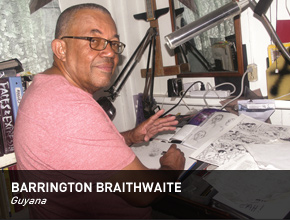
Barrington Braithwaite
Place of Birth: Guyana
Date of Birth: November 16, 1956
He was trained as a Scientific Illustrator and researches using Social Anthropological models. Braithwaite works with the understanding that the world around him was constructed with falsifications based on racist stereotypes. He has written and illustrated many books including, Voyage Book of Poetry, Drums of Freedom, The Saga of the Haitian Revolution, Adventures of Turnaround Village and Illustrated History of the Pork Knockers.
He has also published comic strips in the daily newspapers including, Shrouded Legacy and Shadow of the Jaguar. Among the published comic books are, The Adventures of Brer Anancy, Journey to the New World (tribal Ashanti mythology), and Legend of the Silk Cotton Tree evolved into Guyana’s signature play for CARIFESTA X.
Illustrations on Commission include: A Man Called Garvey; A Documentary History of Slavery in Berbice 1796-1834; Historical Iconography and illustrated features for Free Press- Emancipation Magazine; Historical comics- Kwamina 1823, and Kofi 1763; 1834 Abolition Story; and The Damon Story

Betty Garcés Bedoya
Place of Birth: Buenaventura, Colombia
Date of Birth:
She began her music and singing studies at the Antonio Maria Valencia Conservatory in Cali. Later, she studied at the Superior School of Music in Cologne, Germany, where she obtained a Master of Arts degree with a specialization in Opera and Lied in 2012. In the same year, she made her first national tour with the renowned Colombian pianist Alejandro Roca.
She played the roles of Cleopatra in the Opera "Giulio Cesare" by Händel, Violetta, in the Opera "La Traviate" by Verdi and Fiordiligi, in the Opera "Cosi fan tutte" by Mozart, among others. Within her operatic repertoire, she has performed the roles of the Countess in Las Bodas de Figaro, Mimi in the Boheme, Liú in Turandot, Sour Angelica, Micaela in Carmen, Antonia in the stories of Hoffmann, Amelia in Simón Bocanegra and Elisabeth in Tannhauser.
Betty was a finalist at the auditions for the Young Artists Program 'Jette Parker Young Artists Program' of the Royal Opera House of London. She has been a guest singer for the reopening of the Colon Theater in Bogotá, for the ISPA Performing Arts Congress 2014 in Bogotá and for the closing concert of the Lied festival in the city of Hannover 'Neue Stimmen, Neues singen.'
She was a member of the Junges Ensemble of the Opera of Gelsenkirchen in the 2013/2014 season, where she played the role of Janus in the Opera "Jenufa" of Janacek, among others. That same year she sang as a soprano in Beethoven's Ninth Symphony, accompanied by the Simón Bolívar Orchestra of Venezuela.
Currently Betty is part of the "Solo Klasse" program of the Higher School of Music, Theater and Media of the city of Hannover.
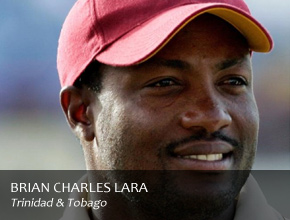
Brian Charles Lara
Place of Birth: Santa Cruz, Trinidad & Tobago
Date of Birth: May 02, 1969
Brian Lara is a colossus of Test cricket who is regarded by many as the king of modern batsmen and embraced at home as the Prince of Port of Spain. It is a fitting tribute to this outstanding left-hander that the impressive array of records he has held over the years is unlikely ever to be broken by any one batsman. He was awarded the Nation’s highest award – the Trinity Cross, in 1994 and Order of the Caribbean Community in 2008.
Lara is widely regarded as one of the finest batsmen ever. He earned a place on the regional team just a few years before the fortunes of the world-beating West Indies squad of the late Seventies and Eighties began to wane. So outstanding were his individual achievements that Lara was inducted into the ICC’s Hall of Fame in 2012; received the prestigious BBC Overseas Sports Personality of the Year and earned himself the Wisden Leading Cricketer in the World Award in 1994 and 1995.
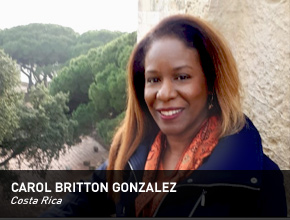
Carol Britton Gonzalez
Place of Birth: San José, Costa Rica
Date of Birth: July 10, 1964
Graduated from the University of Sao Paulo, Brazil with a degree in music, as an instrumental performer and as an orchestra musician with a specialty in viola. She has a master's degree in Project Management from the University of International Cooperation of Costa Rica and studies in International Relations from the Estacio de Sá University, Rio de Janeiro, Brazil.
Her experience as a member of the Experimental Repertoire Orchestra of the Municipal Theater of Sao Paulo, Brasil and her diplomatic work in Brazil contributed to the foundation of the Festival “Flowers of the African Diaspora,” a pioneer celebration in Costa Rica which commemorates the African background legacy through art, culture and education, not only in Costa Rica but in the Central American region.
Carol is a researcher, human rights activist, cultural leader grounded on the Afro-descendant culture. She is the General Coordinator of the International Oratory Contest “Flowers of the African Diaspora and Other Cultures” held in 7 countries. In addition to this, she organizes the African Diaspora Film Festival-Costa Rica and the Afro Runway-Costa Rica. Annually, she coordinates art exhibitions, historical seminars and literary productions for Afro-descendant authors.
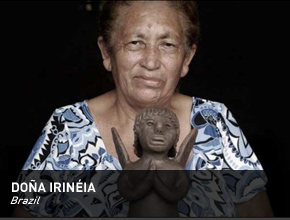
Doña Irinéia
Place of Birth: União dos Palmares, Alagoas
Date of Birth: January 7, 1949
Irinéia Rosa Nunes da Silva (Dona Irinéia) hails from the Cimarron village of Muquém, where she began to work with pottery to supplement the family income. The artisan uses clay and firewood to reproduce real-life characters seen in the Cimarron community. Dona Irinéia was a finalist of the UNESCO Award of Excellence for Handicrafts and her sculptures were displayed at the Milan Expo.
The mud - main raw material of his work - comes from the Mundaú river. In 2010 the village was destroyed by a flood. Dona Irinéia lost approximately 2,000 sculptures, but after overcoming the natural disaster she produced one of her most significant works: “A jaqueira e a lenha.” In 2018, the Government of the State of Alagoas installed a replica of her work "The Kiss of Mistress Irinéia" on the border of Lagoa da Anta, in the State’s capital city, Maceió.

Dr. Edgar Adams
Place of Birth: St. Vincent and the Grenadines
Date of Birth: September 03, 1932
Dr. Edgar Adams, affectionately known as Doc, was a Vincentian optometrist and cultural stalwart who passed away on February 13, 2019.
Doc was instrumental in facilitating the creation and improvement of Vincentian artwork by providing both moral and financial support to local artists. Additionally, he was custodian of significant collections of local writings, including unpublished works of several local poets. His contribution as a businessman was also significant. Parts of the “Volcano Suite” were penned by his good friend Shake Kean at one of his restaurants. Vincentian Jazz piano player, Monk Waldon was another artist who frequented and composed in that space.
The life of Doc Adams will be remembered by many including the constant line of students who sought his knowledge, the cultural practitioners who sought his counsel, and his many friends who sought his company.
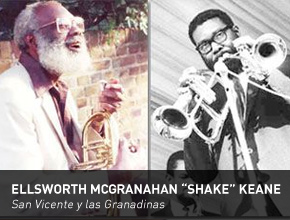
Ellsworth McGranahan “Shake” Keane
Place of Birth: Kingstownm, St Vincent
Date of Birth: May 30, 1927
Ellsworth McGranahan “Shake” Keane was born on May 30, 1927, and died on October 11, 1997. A musician from the age of six, he was taught to play musical instruments by his father. Eventually he rose to fame in international jazz circles as a trumpet and flugelhorn player. Born into a family of musicians in his native St. Vincent, he was a part of The Keane Brothers and also a member of one of the island’s leading dance bands, Ted Lawrence and His Silvertone Orchestra. He also became a pupil-teacher in the island’s grammar school in 1944, where he taught music and French.
But poetry was equally his passion. L’Oubli, his first collection, was published in 1950, when he was 23 years old, followed by Ixion in 1952. He went on to publish three more collections, One a Week with Water: Rhymes and Notes and The Volcano Suite, both in 1979, and Palm and Octopus in1994.
Shake eventually moved to England where he began to consider himself a jazz musician. He played with the Joe Harriott Quintet, the Michael Garrick Quintet, and later, in a move to Germany, with bands led by Kurt Edel Hagen, Francy Boland, and Kenny Clarke.
In 1972, Shake took up an offer to return to St. Vincent as director of the National Department of Culture. He later returned to secondary school teaching and resumed his poetry. In 1979 he was awarded Cuba’s Casa de las Americas.
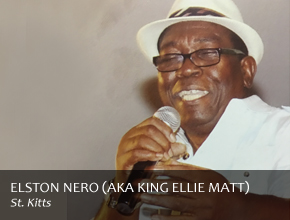
Elston Nero (AKA King Ellie Matt)
Place of Birth: Newtown, St. Kitts
Date of Birth: January 23, 1953
Ellie Matt began his musical career at the age of 8. He is a self-taught musician and has composed over 100 songs. He dominated the musical landscape of St. Kitts-Nevis for over two decades by winning the Senior Calypso competition ten times and the Road March title seven times. In 1973, his musical band, the GI’s Brass International, won the Caribbean Brass-O-Rama competition. He has taught music, wrote songs for many artistes, and produced several bands throughout the Caribbean. He was the Mighty Sparrow’s musical director during a tour of Japan and Europe.
His songs have inspired generations to uplift themselves and develop a sense of national pride. In 2008, he was inducted into the International Soca Awards (ISA) Hall of Fame, and was awarded the Medal of Honour by the Government of St. Kitts-Nevis for his outstanding contribution to music and culture. He has been described as one of the Caribbean’s most gifted and celebrated musical icons.
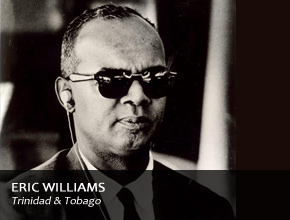
Eric Williams
Place of Birth: Port of Spain, Trinidad & Tobago
Date of Birth: September 25, 1911
Dr. Eric Williams wears the mantle of the Father of the Nation of modern Trinidad and Tobago. Over an unbroken period of 25 years, from 1956 until his death in 1981, he led the Government, first as Premier and subsequently as Prime Minister, guiding the country from colonialism into Independence in 1962 and to the status of Republic in 1976. Dr. Williams was a historian whose seminal work, Capitalism and Slavery (1944), challenged the prevailing orthodoxy by identifying the role of West Indian slavery in financing Europe’s Industrial Revolution and its economic development and progress. In 1948, Dr Williams made an impact on the colony’s political life, attracting huge crowds to his public lectures at the place he christened The University of Woodford Square. Dr. Williams also played an instrumental role in the formation of CARICOM. In 2002 he was awarded the Nation’s highest award – the Trinity Cross. Dr. Williams led the People’s National Movement (PNM) until his passing.
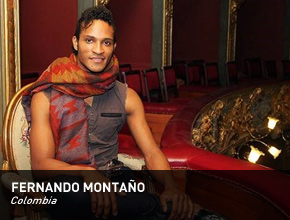
Fernando Montaño
Place of Birth: Buenaventura, Colombia
Date of Birth:
Ballet dancer, who at the age of 14 received a scholarship for the National Ballet School of Cuba, where he won several awards in the International Ballet Competition of Havana; later on, he got associated to the National Ballet of Cuba. In 2006 he joined the Royal Ballet of London; he is the first Colombian to dance with this company. In 2010, Montaño was promoted to main artist and since then, he has played more important roles each time.
In 2009, he received an Honor Mention in New York, for his outstanding work in the arts. In 2014 he was awarded with the Latin Personality of the Year Award, in The LUKAS Awards, from London. That same year he made his debut in the grand screen as the protagonist of the short film "Narciso", choreographed and produced by the Italian Giorgio Madia.
The Colombian / Puerto Rican film 'Fragmentos de Amor', directed by Fernando Vallejo, debuted in October 2015, in which Fernando played the character of a salsa dancer.
He has developed choreographic works in Colombia with the Latin Dance group of Cartagena and with the Swing Latino Company of Cali, in 2016.
In 2019 he presented 'Barroco Travel' at Teatro Colón. The play focuses on the vicissitudes of two western couples in crisis, both with opposite social and economic realities, facing the same problem that nowadays affects both hemispheres of the planet.
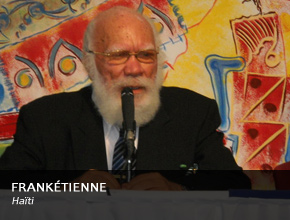
Frankétienne
Place of Birth: Ravine-Sèche, Haiti
Date of Birth: April 12, 1936
"I am the blackest white man in Haiti", is a quote that perfectly defines this intellectual and cultural icon of Haiti. Teacher and multifaceted artist (writer, painter, musician) who despite his clear skin and green eyes is a faithful representation of the Haitian cosmovision and its African roots.
Famous not only for his great literary work that has earned him important and numerous recognitions both at home and abroad, including the Nobel Prize nomination, he writes in French and Creole. The latter language, he uses mainly in his theatrical production, which has earned him the recognition of the public of oral tradition. In the period of great social repression and cultural obscurantism, he did not abandon his country nor his principles.
UNESCO named him Artist for Peace as part of Haiti's cultural reconstruction program following the devastating effects of the January 12, 2010 earthquake.
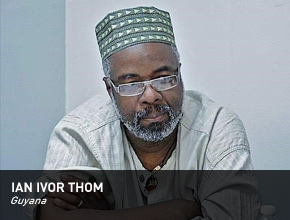
Ian Ivor Thom
Place of Birth: Guyana
Date of Birth: April 4, 1954
Administrator Burrowes School of Art: Sculptor/Lecturer in Sculpture, History of Art, Jewelry, and Drawing. Introduced artistic bronze casting to Guyana. Worked in Kenya to understand the use of their indigenous tools.
In Guyana erected the 1823 Monument depicting the 1823 East Coast Rebellion, and the Damon Monument in Anna Regina, Essequibo Coast. He also designed and built the tomb and the bronze panels on the Mausoleum housing the remains of the Late President of Guyana, Linden F.S. Burnham and a bronze bust in his honor.
Abroad, he sculpted Guyana’s permanent exhibit (depicting a run-away slave) which is housed in the Museum of the Non-Aligned Movement in the former Yugoslavia. He worked on one of the largest bronze sculptures done in Cuba depicting Antonio Maceo, a Cuban National Hero. Privately commissioned pieces can be found in Guyana, the Caribbean and the USA.
Mr. Thom has also worked with many organizations to promote African Culture in Guyana.
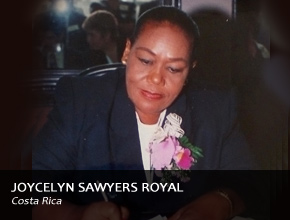
Joycelyn Sawyers Royal
Place of Birth: Puerto Limon, Costa Rica
Date of Birth: October 1, 1940
Joycelyn Sawyers Royal grew up in very tough social and economic conditions in Puerto Limon, Costa Rica. She studied in Costa Rica and Mexico. She has been a teacher and a university professor, as well as founder of an ethnic orientation school. She won the Mauro Fernández Acuña National Award as distinguished teacher. As congresswoman she promoted the reform of the First Article of the Constitution in order to declare Costa Rica a multiethnic and multicultural country; she led the proposal to declare Alex Curling Distinguished of the Homeland. She also achieved the approval of the National Day for Ethnic and Linguistic Diversity. She endorsed the opening of a traveling ethno historic museum, which promoted the creation of the Museo de Limón.
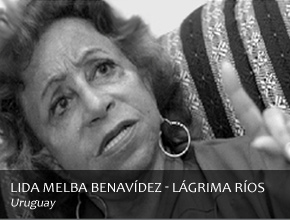
Lida Melba Benavídez - Lágrima Ríos
Place of Birth: Durazno, Uruguay
Date of Birth: September 26, 1924
Lida Mela Benavidez is recognized for being one of the principal advocates for afro culture in Uruguay and as the only black singer of Rioplatense tango. She took an important representative role in the Afro-Uruguayan community as president of Mundo Afro.
She is known as Lágrima Ríos who stood out for her candombe chants. She is also known as “the black pearl of tango” and the “lady of candombe.” It is said that she “represents the noblest essence of mixed race and black singing.” She had a strong voice, as she herself stated: “we blacks have vocal chords a bit thicker than whites.”
She debuted as a singer in 1942, interpreting folklore and tango songs. She is recognized internationally for her excellent quality and musical strength, as well as her talent as an actress. She was also president of Mundo Afro organizations and she stands out for her efforts against racism, xenophobia, and intolerance.
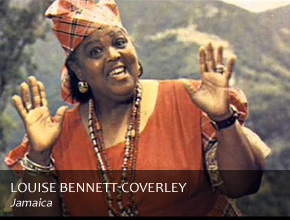
Louise Bennett-Coverley
Place of Birth: Kingston, Jamaica
Date of Birth: September 7, 1919
Louise Bennett had her first poetry published by the Sunday Gleaner in 1943. As Louise’s work began to be noticed, she became the first black student to be awarded a scholarship by the British Council to study at the Royal Academy of Dramatic Art. While in England, Bennett worked with different repertory companies, while hosting two radio shows on the BBC, “Caribbean Carnival” (1945-1946) and “West Indian Night” (1950). After returning to Jamaica, Bennett worked for the Jamaica Social Welfare Commission, teaching classes on folklore and drama at the University of the West Indies. She continued to share her talents both on radio and television, through “Miss Lou’s Views” and “Ring Ding.” Along with her performing talents, she also wrote many books and poetry in Jamaican Patois, which helped to bolster it as the “national language” which is accepted for literary expression. Bennett was praised for her ability to present the Jamaican language and culture to the wider world, while also portraying a unique perspective on the everyday life of working-class, postcolonial women.
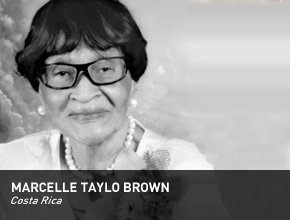
Marcelle Taylo Brown
Place of Birth: Puerto Limón, Costa Rica
Date of Birth: January 3, 1933
Nationally recognized for her contribution to the defense, rescue and strengthening of the Afro-Caribbean culture of Costa Rica and for her efforts towards the inclusion of women and girls from Limón in the education system, culture, sports and politics.
Along her political career, she became the first woman of black ethnicity to head a ballot of the Christian Social Unity Party for the Province of Limón, being elected as congresswoman during the period from 1986 to 1990. She had an important participation in the formulation of laws on education, sports and women's rights issues, an example of them was the Law Project for the Promotion of Women's Social Equality.
She has represented Costa Rica in countless assemblies and international meetings and has occupied high level positions in the public service, among them, President a.i. and Vice-president of the Port Administration and Economic Development of the Atlantic Coast Board, President of the Board of Directors of Banco de Crédito Agricola de Cartago, and Director of the Technical Support Department of the Regional Office of Education in Limón, among other key positions.
Recipient of several recognitions and acknowledgments from the Legislative Assembly of the Republic and public institutions of the country, Marcelle Taylor Brown currently serves as General Coordinator of the Cultural Civic Committee of the Black Ethnic Group of Limón (INAMU, 2019).
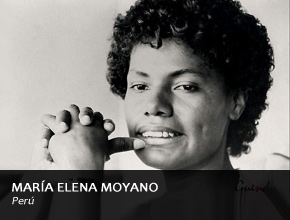
María Elena Moyano
Place of Birth: Barranco, Peru
Date of Birth: November 23 1958
Afro-Peruvian, social fighter, and local leader of the district of Villa el Salvador. Known as “Mother courage”, she represented one of the most notorious personalities of opposition to the terrorist group Sendero Luminoso, an organization that between 1980 and 2000 raised in armed conflict against the Peruvian State. From her role as president of the Women’s Federation of Villa El Salvador, she stood against Sendero, and in defense of human rights and the construction of a culture of peace, mobilizing the population of her district and having great influence in the rest of the country.
On February 15th 1992, while going to an activity of the club “Vaso de Leche”, she was assassinated by a command of annihilation of Sendero. Moyano represents the rise of Peruvian women to positions of leadership and political power that until then, had been few or non-existent.
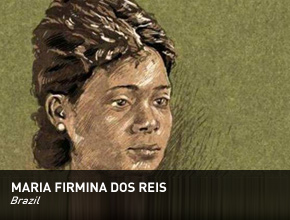
Maria Firmina dos Reis
Place of Birth: São Luís, Maranhão
Date of Birth: March 11, 1822
Maria Firmina dos Reis, author of "Úrsula" (1859) was the first Brazilian novelist to highlight Afro-Brazilian characters. Its literary production is marked by the great humanist ideal of the 19th century - the struggle for the end of slavery. Her work came before other well-known books by more established Brazilian writers such as Castro Alves' poem "Navio Negreiro" (1869), and the novel "Escrava Isaura" (1875), written by Bernardo Guimarães.
Like many other Afro-descendant authors, she was only recognized by the academy in 1962, through the work of the historian Horacio de Almeida. As part of the process of “memory erasure,” Maria Firmina was several times presented as a white woman, which can be considered as a racist form of "whitening" - as they did with another icon of Brazilian literature, Machado de Assis.

Misty Copeland
Place of Birth: Kansas City, Missouri
Date of Birth: September 10, 1982
Born in Kansas City, Missouri and raised in San Pedro, California, Misty Copeland began her ballet studies at the age of 13 at the San Pedro City Ballet. In September 2000, Copeland joined American Ballet Theatre’s (ABT) Studio Company. In August 2015, Misty Copeland was promoted to principal dancer, making her the first African American woman to hold the position in ABT’s 75-year history.
In 2015, Copeland was named one of TIME Magazine’s 100 Most Influential People. She also traveled to Rwanda with MindLeaps to establish The Misty Copeland Scholarship. Misty’s passion is giving back, including work with youth organizations. Copeland is the author of the best-selling memoir, Life in Motion, children’s book Firebird; and her newest book Ballerina Body. She received an honorary doctorate from the University of Hartford in 2014 for her contributions to classical ballet, and is recognized as an outspoken advocate for diversify in the art form.
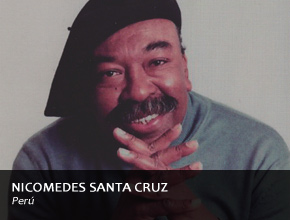
Nicomedes Santa Cruz
Place of Birth: La Victoria, Peru
Date of Birth: June 4, 1925
Nicomedes Santa Cruz was one of the most notable Afro-Peruvian intellectuals, whose presence transcended the artistic sphere and was projected onto the terrain of social criticism and politics. He was one of the most active Peruvian intellectuals of his generation: he published hundreds of articles in newspapers and magazines over several decades, and academic articles on different aspects of history, culture, religion, poetry and oral traditions of the afro-descendant community. He also recorded a dozen albums, directed radio and television programs, represented Peru at various international festivals and lectures at home and abroad, and offered recitals of poetry at solidarity festivals and literary events in several countries, among many other Artistic activities that honored the Peruvian nation.
In honor of his birth, our country commemorates the 4th of June of each year, as the “Afro-Peruvian Culture Day”.
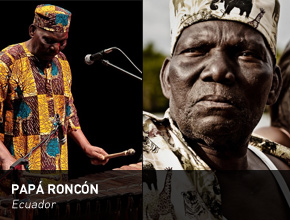
Papá Roncón
Place of Birth: Borbón Esmeraldas, Ecuador
Date of Birth: September 10, 1930
Guillermo Ayoví Erazo known as "Papá Roncón", has demonstrated during his artistic career a strong and deep sense of belonging to his people and his traditions. Roncón represents a source of cultural energy and his activity evidences a conscious obedience to the ancestral mandates and to his status as a guardian of the marimbera tradition, since him and the marimba are part of the cultural identity of Afro Ecuadorians.
He is aware of his enslaved descendants and that in that context the marimba fulfills a social function; that is why his music is an expression of joy, happiness, a loud cry of freedom and cultural resistance.
In 1981, Papá Roncón founded the marimba school called "La Catanga", which for over fifty years has taught the children and young people of Esmeraldas how to build and play instruments and how to dance. In 2011, he was awarded the "Eugenio Espejo National Culture Award" for his work in preserving Afro-Ecuadorian culture, through the practice and teaching of the Marimba.

Philip Akin
Place of Birth: Kingston, Jamaica (Canadian Citizen)
Date of Birth: 1950
Philip Akin is a Canadian Citizen born in Kingston, Jamaica in 1950. He has been acting and directing for over 40 years. In 2000, he was a founding member of Obsidian Theatre, Canada’s leading black theatre company, and has served as its Artistic Director since 2006. In this role, he has worked tirelessly to provide opportunities and guidance for emerging artists. In 2002, he was part of the team that launched the Obsidian Mentor/Apprentice Program, a one-of-a-kind program that has so far helped 61 black artists embark on exciting careers as directors, dramaturges, producers, production managers, lighting, set and costume designers with some of the most established performing arts companies nationwide.

Quince Duncan
Place of Birth: San José, Costa Rica
Date of Birth: December 5, 1940
Doctor Honoris Causa, St. Olaf College, Northfield, Minnesota. Writer and educator with a Bachelor of Arts in Latin American Studies, Literature and Linguistics.
He is a state and retired professor at the National University and visiting professor at Alabama, Indiana, Pennsylvania, and Purdue Universities.
Duncan authored more than 50 books on history, literary criticism, ethnic issues, and a dialogic essay on black history, the afro-descendant community, as well as manuals on education and fictional writings.
He has been awarded Costa Rica’s Editorial Prize in 1978, and the National Literature Prize in 1979.
Duncan is a researcher and activist on human and ethnic rights, he has been part of international programs focused on fighting racism and promote knowledge on African culture and afro-descendants. Duncan has also presented literary and ethno-racial topics on Africa, Australia, Europe, Canada, the United States, Mexico, South America, and the Caribbean.

Rafael Palacios
Place of Birth:
Date of Birth:
Choreographer, professor and Afro-Colombian dancer, researcher of Afro traditional, contemporary and urban dance. His experience as a dancer in Africa and Europe has been the basis for the creation of the company Sankofa; founded by him in 1997 as a space dedicated to training, research and artistic creation.
“Sankofa”, meaning, “to return to the root”, is more than a word, it’s an African philosophy that proposes that the past is a keyhole through which to view the present, and to be able to consider the future. Rafael have won important awards such as the National Dance Award 2008, for the work San Pacho ... Bendito; the National Arts Award 2017, awarded by the University of Antioquia and the Ministry of Culture; and, Sankofa received mention from United Nations for its “Good practice of Afro-descendant social inclusion in Latin America 2010”, for the company’s project “Steps in the Earth.”, developed with the dance communities in the Pacific regions of Chocó, Urabá, and San Andrés and Providencia islands, in agreement with the 2008-2016 of the Ministry of Culture programs “Training for Trainers” and “Danza Viva”.
His choreographies have a wide repertoire and a scenic trajectory, which includes countries such as France, Spain, Jamaica, Brazil, Burkina Faso, Uruguay, Canada, China, Peru and the United States.
Palacios holds a degree in basic education in Dance from the University of Antioquia. Specialist in Epistemologies of the South from the Latin American Council of Social Sciences, and is currently working towards a Master's Degree in Education and Human Rights, at the Universidad Autónoma Latinoamericana.

Robert Nesta “Bob” Marley
Place of Birth: St Ann, Jamaica
Date of Birth: February 6, 1945
Robert “Bob” Marley is recognized as one of the world’s greatest singer-songwriters/musicians. In the mid-1960s Marley joined “the Wailers” with Bunny Wailer and Peter Tosh. The original Wailers broke up in the early 1970s and Marley continued recording under the name “Bob Marley & The Wailers.” In 1975, Marley began to make his mark internationally with his hit “No Woman, No Cry,” followed by his breakthrough album “Rastaman Vibration”. He not only had personal professional success but also made the Jamaican music form, Reggae, world famous. His songs were of social consciousness, human rights and justice. He used his music to advocate for racial equality, freedom from oppression, decolonization and the decriminalization of marijuana (a religious rite of Rastafarians). Despite an attempt on his life in 1976, Marley continued to create hit music until his death in 1981. His last studio album, released posthumously, included hits such as “Redemption Song” and “Forever Loving Jah.” Bob Marley’s legacy lives on, including his belief in rastafarianism and pan Africanism.
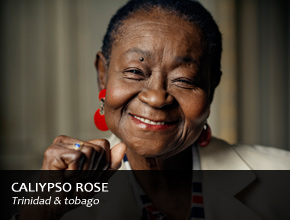
Rose McCartha Linda Sandy Lewis (AKA Calypso Rose)
Place of Birth: Bethel Village, Trinidad & Tobago
Date of Birth: April 27, 1940
Calypso Rose began her career at 15 in the then male dominated arena of Calypso emerging to win the national carnival Road March title in 1977 and first Calypso Monarch title in 1978 after holding the Calypso Queen title for five years. In a class by herself, Calypso Rose holds awards both nationally and internationally having most recently been awarded Best Album in the World at the Victoires de la Musique (French ‘Grammys’) in February 2017.
Included in her volumes of music are varied themes from political commentaries to jammin’ party songs and rhythms while also raising our awareness of current conditions and taking a stand on women’s rights. Calypso Rose is still expanding her horizons, fusing the rhythms and melodies of Africa, Central America, and the Caribbean. Besides being a vibrant and exciting performer and composer, Rose’s world-wide recognition has made her one of the most awarded and honored figures of the Caribbean music scene.
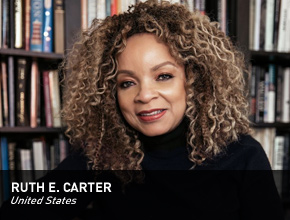
Ruth E. Carter
Place of Birth: Springfield, MA
Date of Birth: April 10, 1960
Ruth E. Carter’s unparalleled ability to develop an authentic story through costume and character has made her one of the most sought after and renowned costume designers today. She garnered two Academy Award (Oscar) nominations for “Best Costume Design,” for Spike Lee’s Malcolm X (1993) and Steven Spielberg’s Amistad (1998) and an Emmy nomination in 2016 for the reboot of ROOTS. Ruth has worked in the industry for over three decades, credited with over forty films. Carter is known for her research and diligence to the craft, specifically for her outstanding work for period ensemble films like Lee Daniels’ The Butler and Aca Duvernay’s Selma. Her most recent work in Black Panther garnered her first Oscar win for Best Costume Design in 2019, making her the first African-American woman to do so.
She was honored this year with a Career Achievement Award at the 21st annual Costume Designers Guild Awards (CDGA).
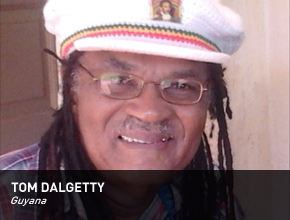
Tom Dalgetty
Place of Birth: Guyana
Date of Birth: November 24, 1939
Tom Dalgety's ancestry included farmers and teachers. His mother won the Dr. J. A Trotman Prize in 1934 at the Negro Progress Convention. Tom was athletics Captain at Queen's College and held office in both the West Indian and African Students Associations at the University of Aberdeen. He studied Chemistry and Geology. He is Pan-African like his parents.
Mr. Dalgety embraced Rastafari during the 1980s. In Guyana, he produced Music from Africa on radio during 1972 - 1980s, and Dalgety's Africa on television from 1999 to the present. His presentations at Appropriate Technology conferences in Africa widened his influence. He is presently setting up maize mills in Namibia. During 2017, he brought KInyua Ngige of Kenya to advice on hydroelectricity using micro falls. He is President of the Confederation of African Nationals and Descendants (Guyana Branch) and is actively involved in initiatives aimed at improving the lives of Afro -Guyanese.

Usain St. Leo Bolt
Place of Birth: Trelawny, Jamaica
Date of Birth: August 21, 1986
Usain Bolt holds the title of “Fastest Man in the World” and became the first track & field athlete to achieve the “Triple Treble,” which is the winning of three gold medals in three different Olympic Games. On his rise to stardom, the world renowned athlete’s talent made an impression at different youth competitions and on the track & field world, which led to his shining moment at the 2008 Beijing Olympics. These Olympic games set the stage for Usain’s historic legacy, as he set the world record for the 100m with a time of 9.69 seconds, for the 200m with a record time of 19.3 seconds and was a part of the 4x100 meters world record Jamaican men’s relay team with a time of 37.1 seconds. At the 2009 World Championships, Bolt was able to once again break his world records in the 100m and 200m, with times of 9.58 and 19.19 seconds, respectively. Bolt defended his undefeated records at the 2012 London Olympics, the 2016 Rio Olympics, and many World Championships in between. Usain Bolt is recognized across the world as the “Greatest Sprinter of all Time.”
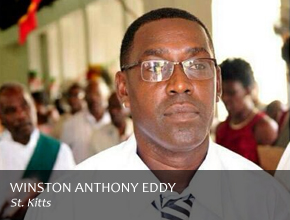
Winston Anthony Eddy
Place of Birth: Basseterre, St. Kitts
Date of Birth: July 16, 1969
Born and raised in the little twin island paradise of St. Kitts & Nevis, Winston Eddy always had big dreams. Being the eldest of four maternal children, his mission was to set a positive example for his younger siblings. A lover of sports from a tender age, he was a member of local soccer teams and various athletic clubs, which enhanced his love for sports. Although he participated in several sporting events, track & field was his all-time favorite and ‘Eddy’ later became a trail blazer in athletics in his beloved country. He represented St. Kitts and Nevis at several CARIFTA and OECS Games and is a former OECS/Leewards Islands 100m and 200m record holder. He also earned a record 3 gold medals at the OECS Texaco championships held in St. Kitts in the year 1990 and was awarded a full athletic scholarship the same year for his athletic prowess.

Yohalmo Cabrera
Place of Birth: Atiquizaya, El Salvador
Date of Birth: August 7, 1957
Yohalmo Cabrera, is a living testimony of the African presence in his country with ancestors from the Panunes group, who came from the Banunes region in Senegambia, West Africa.
In school, he suffered discrimination manifested in indifference, nicknames or pejorative phrases such as "negro", "negrito" or other more offensive mockery phrases, even used by teachers. During his childhood and adolescence, he learned the work of a blacksmith. Graduating as a Primary School Teacher in 1978.
In 2017, along with the Atiquizaya Afro descendants’ community, he promoted the constitutional reform initiative aimed to incorporate the right of the Afro-descendant people of El Salvador in the article 63 of the Constitution, which is currently under discussion in the Legislation and Constitutional Points Committee of the Legislative Assembly.
Through APOKAM and in cooperation with of Costa Rica´s Art and Culture Foundation, he has promoted the International Competition "Flowers of the African Diaspora and other cultures" among high school students in El Salvador.
Since 2009, he has promoted the study of the presence of Afro-descendant population and has been an advocate of the organization and the efforts made for the recognition of their rights through law initiatives, research works, forums, lectures and competitions.

Zab Maboungou
Place of Birth: Paris, France (Canadian Citizen)
Date of Birth: April 6 (unknown year)
A choreographer, dancer, philosopher and writer of French and Congolese origin, Zab Maboungou is the artistic director of Zab Maboungou/Compagnie Danse Nyata Nyata, a contemporary dance company founded in 1987 and based in Montreal. Zab continues her studies in philosophy, a discipline that she teaches and aims to provide theoretical dimension to her reflections on dance, arts and culture. She has written several articles on dance as well as a book, Heya Danse! Historique, poétique et didactique de la danse africaine (2005). Her professional and artistic achievements have inspired the African Affairs committee at Harvard University, where she was a keynote speaker at the conference entitled African Dance Diaspora: A Symposium on Embodied Knowledge.
She was the 2013 recipient of the Charles Biddle Award and, in 2014, of the prestigious Martin Luther King Jr. Achievement Award bestowed by Montreal’s Black Theatre Workshop. In February 2014, Zab Maboungou/Compagnie Danse Nyata Nyata received the 30th Grand Prix du Conseil des arts de Montréal dance award for Mozongi, remounted to celebrate the company’s 25th anniversary.

Zoe Saldaña
Place of Birth: Passaic, NJ
Date of Birth: June 19, 1978
Zoe Yadira Saldaña was born in New Jersey in 1978 to a Puerto Rican mother and Dominican father. She began studying ballet at the age of 10 in the Dominican Republic. Upon returning to New York at 17, Saldaña began to involve herself in theatre groups such as Faces and the New York Youth Theatre. Her ballet training helped land her first on screen part as Eva in Center Stage (2000). The actress' career flourished with roles in Pirates of The Caribbean: The Curse of the Black Pearl (2003), The Terminal (2004), and Guess Who (2005).
Saldaña's career climbed to new heights in 2009 when she played Uhura in Star Trek. She officially joined the A-list with her groundbreaking role in James Cameron's Avatar (2009) and Marvel’s Guardians of the Galaxy. In 2018, she launched the media company BeSe to bring greater diversity to Hollywood and share the real stories of Latin Americans.
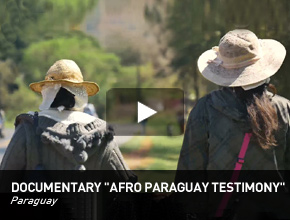
Documentary “Afro Paraguay Testimony”
Paraguay
The documentary "Afro Paraguay Testimony" compiles testimonies about the presence of Afro-descendants in Paraguay and addresses their origins, customs, traditions, destiny and current situation.
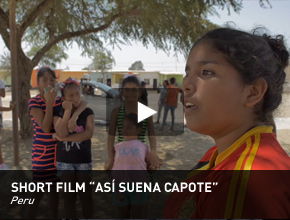
Short film "Así Suena Capote"
Peru
In the Peruvian short film, Así Suena Capote, the residents of Capote narrate how Afro music and dance are part of the traditions and roots of the community. Likewise, the children and the youth reveal that they also wish to maintain this heritage.


